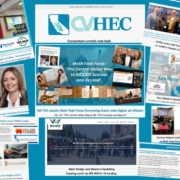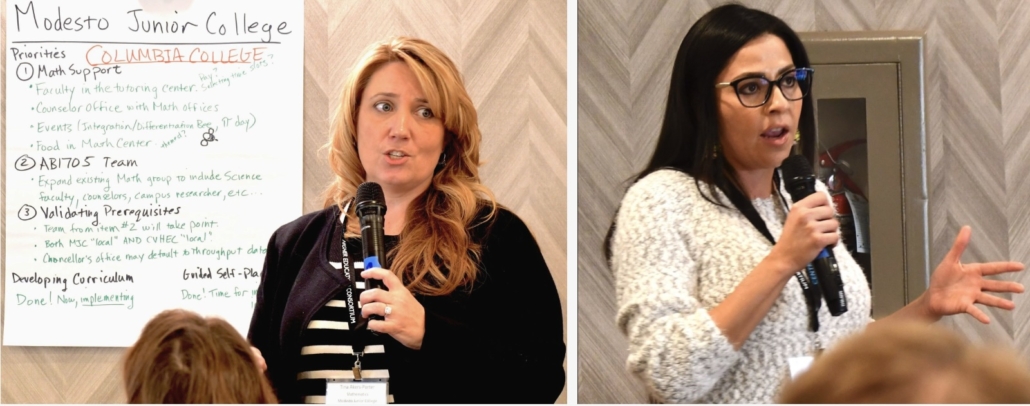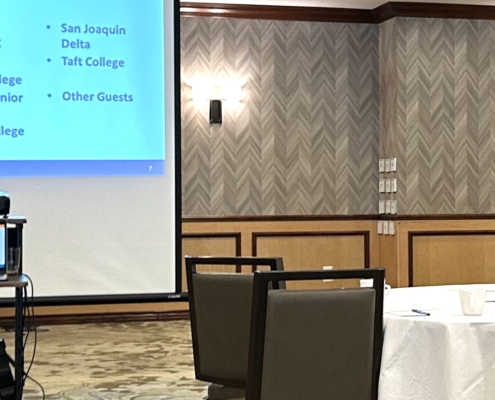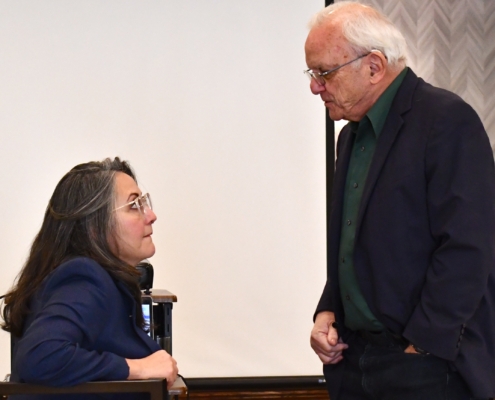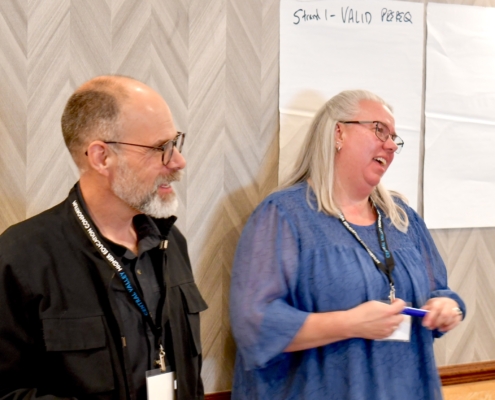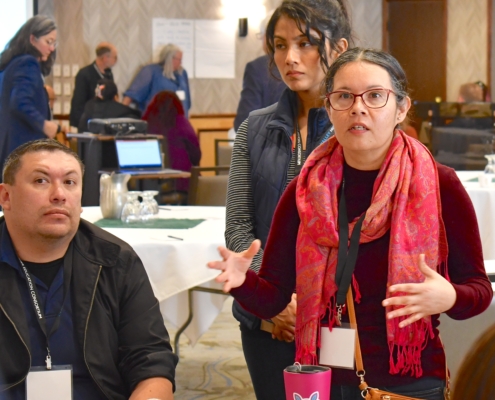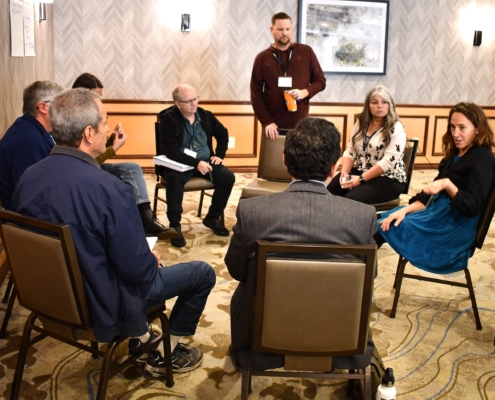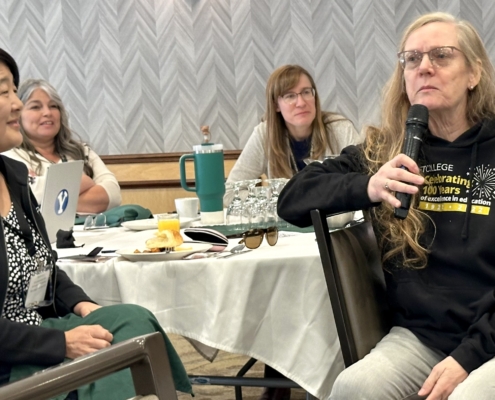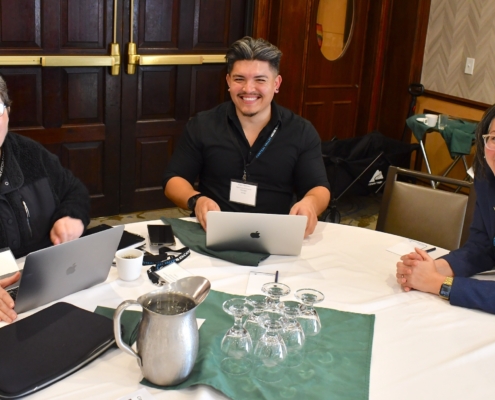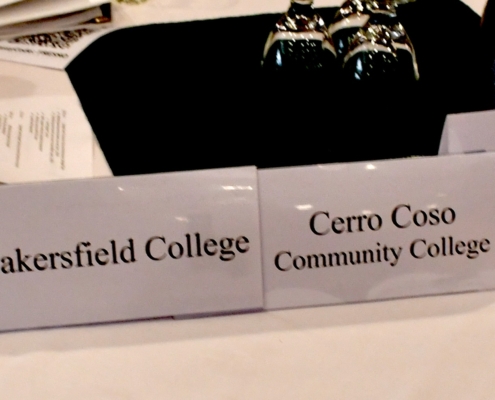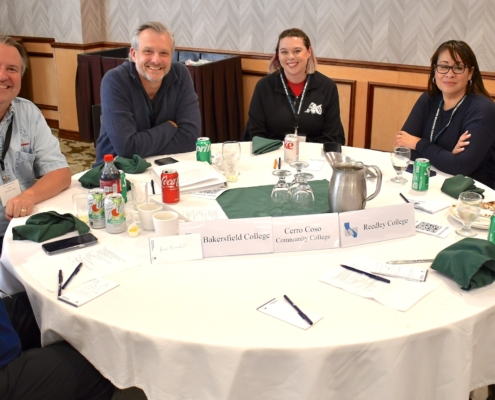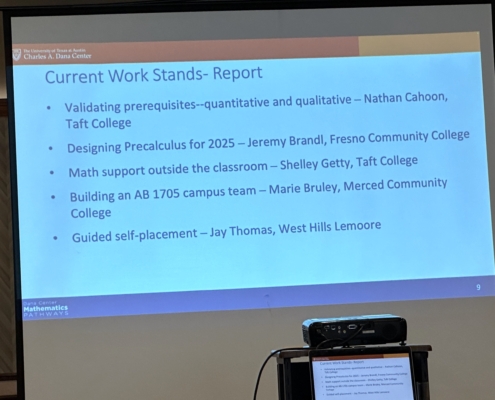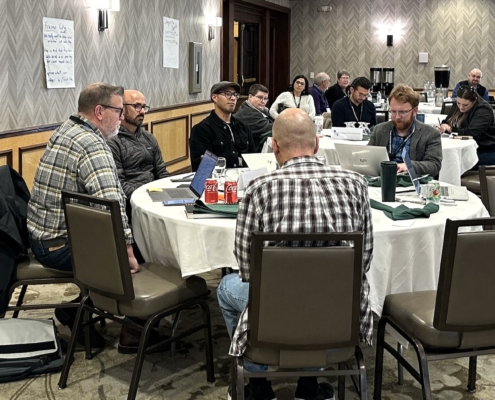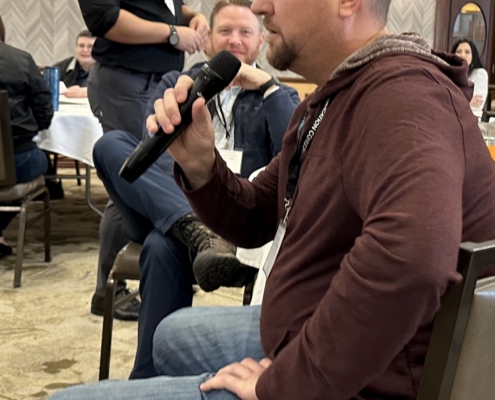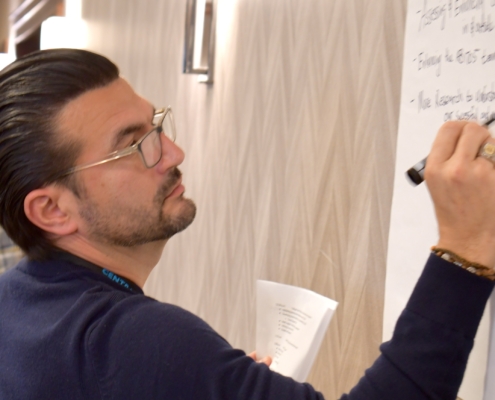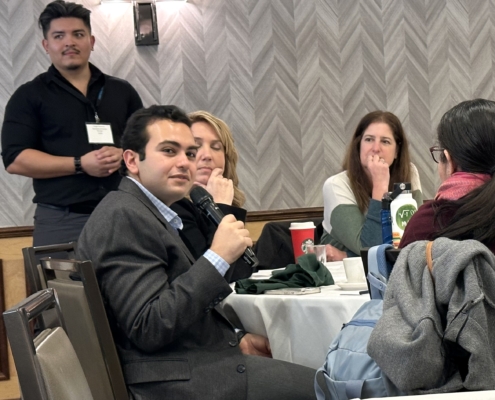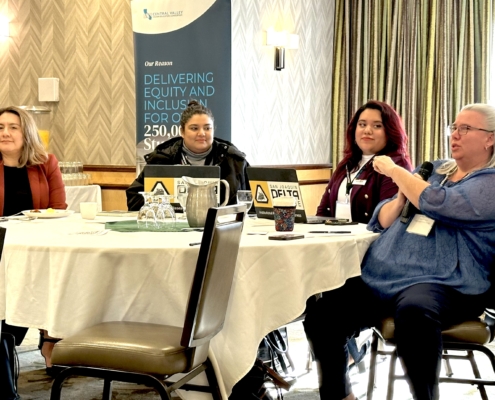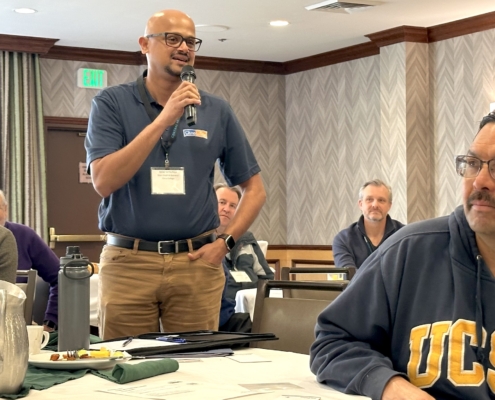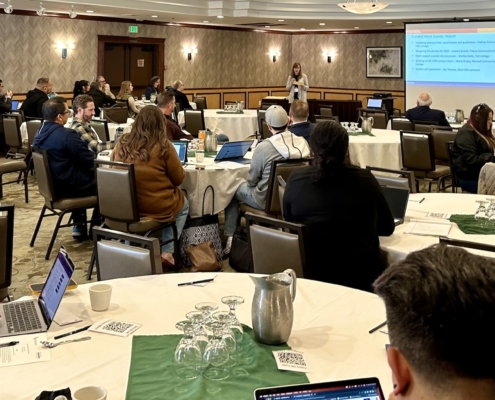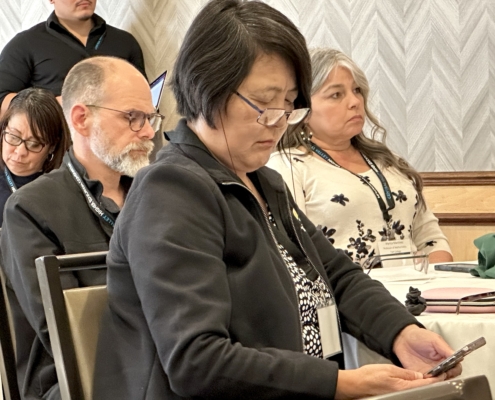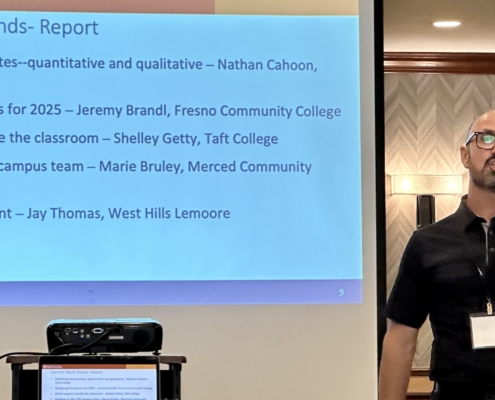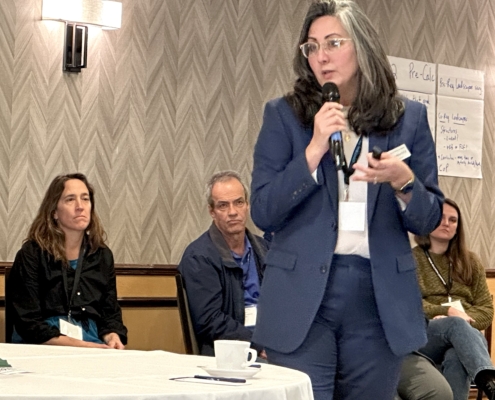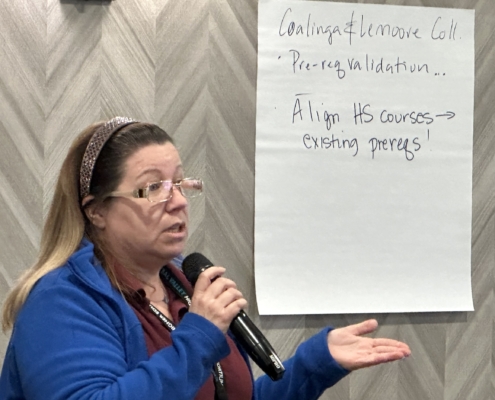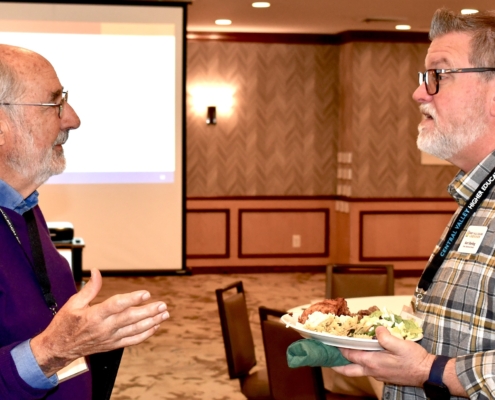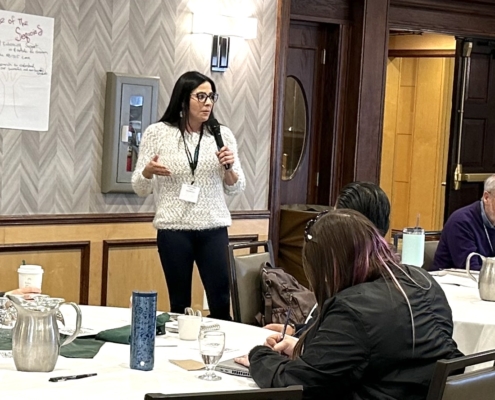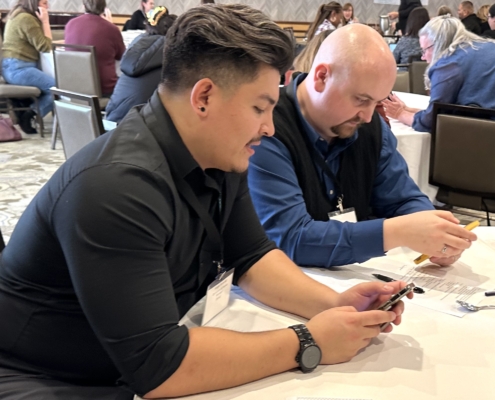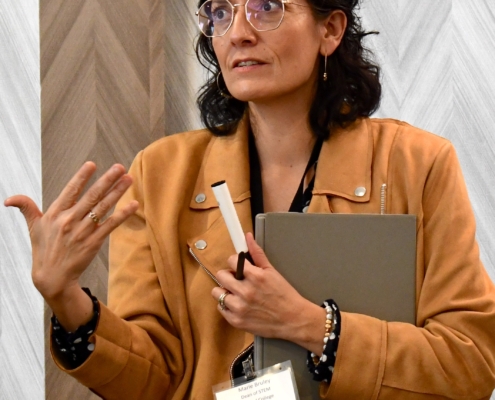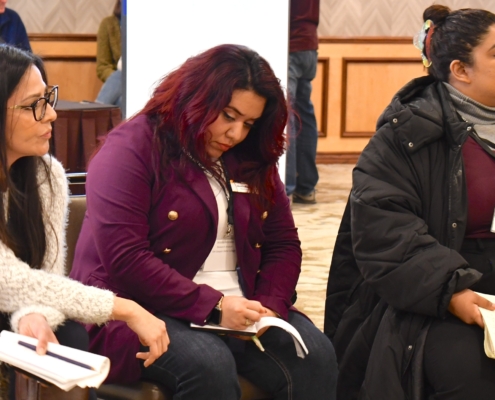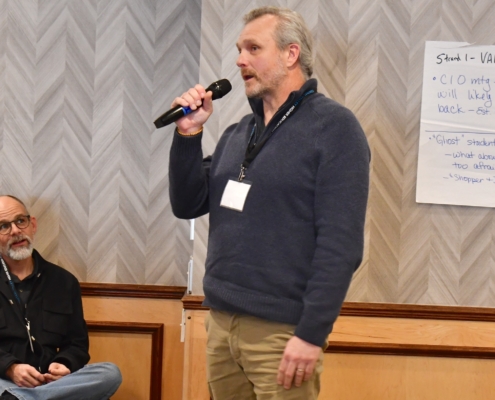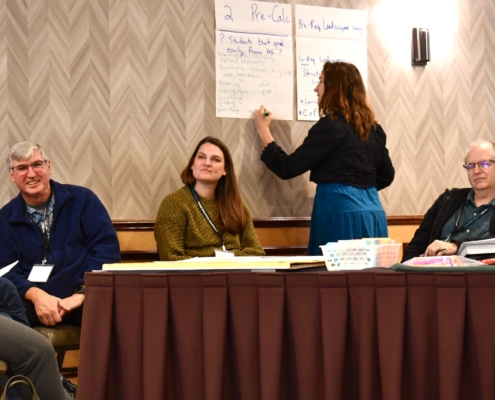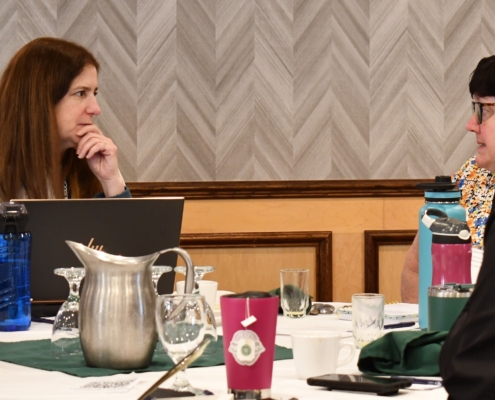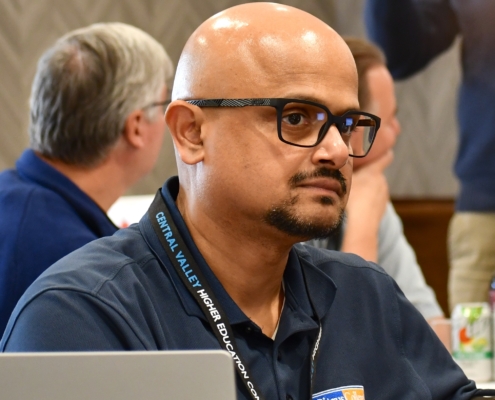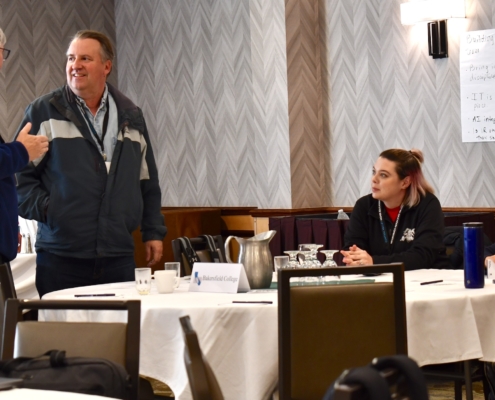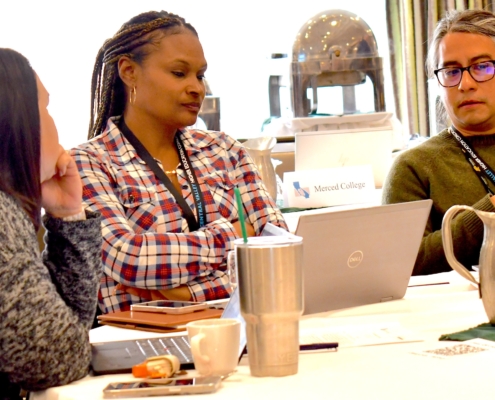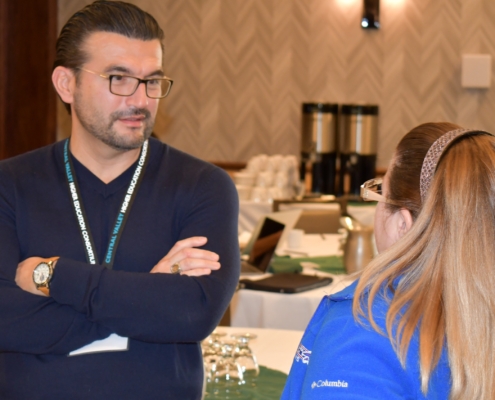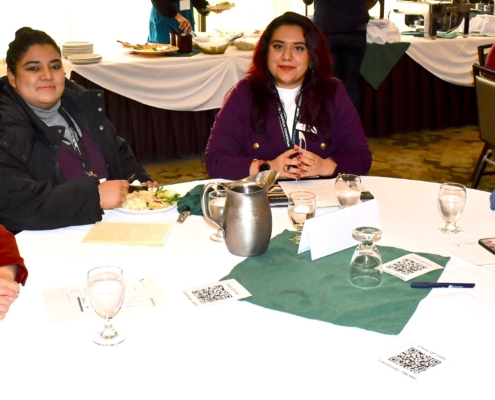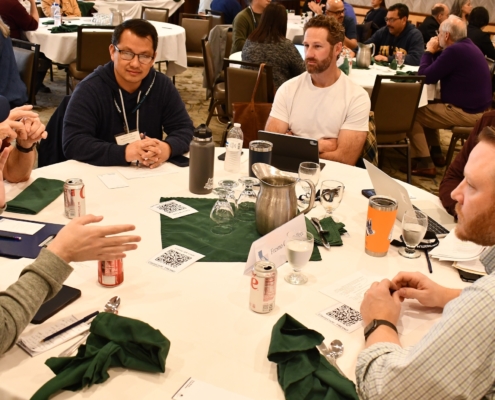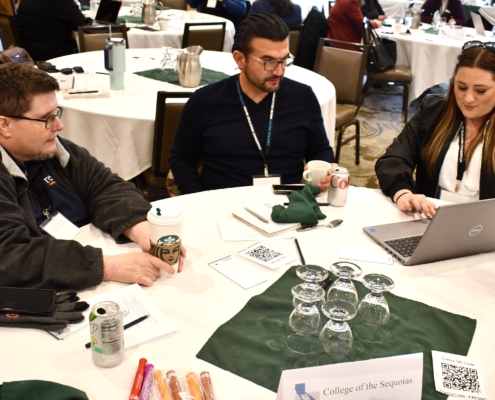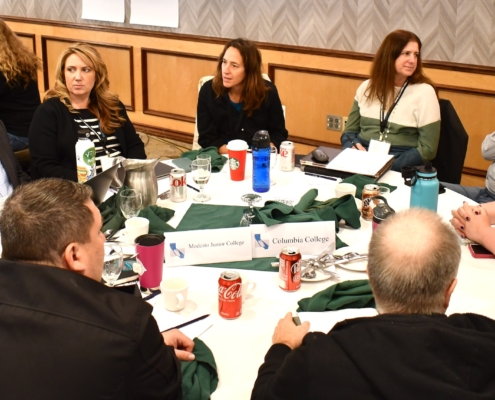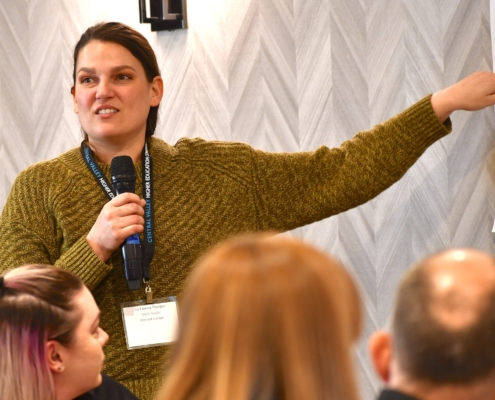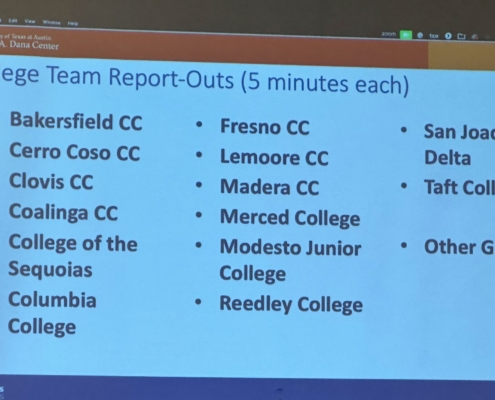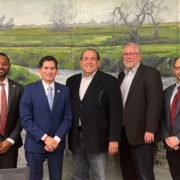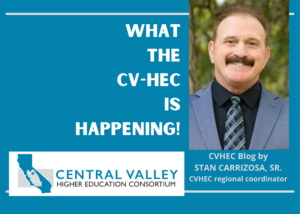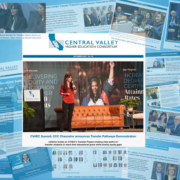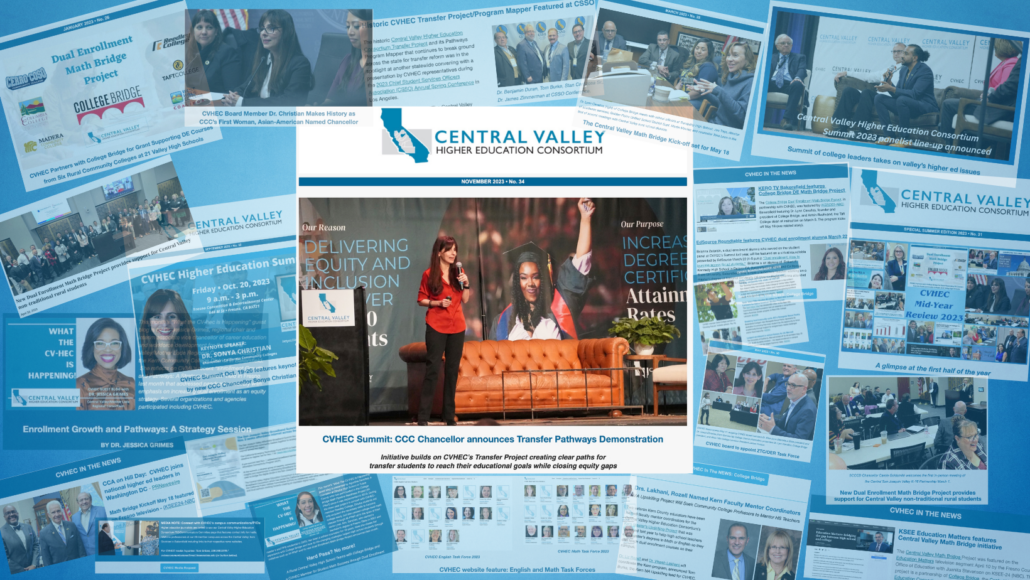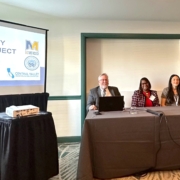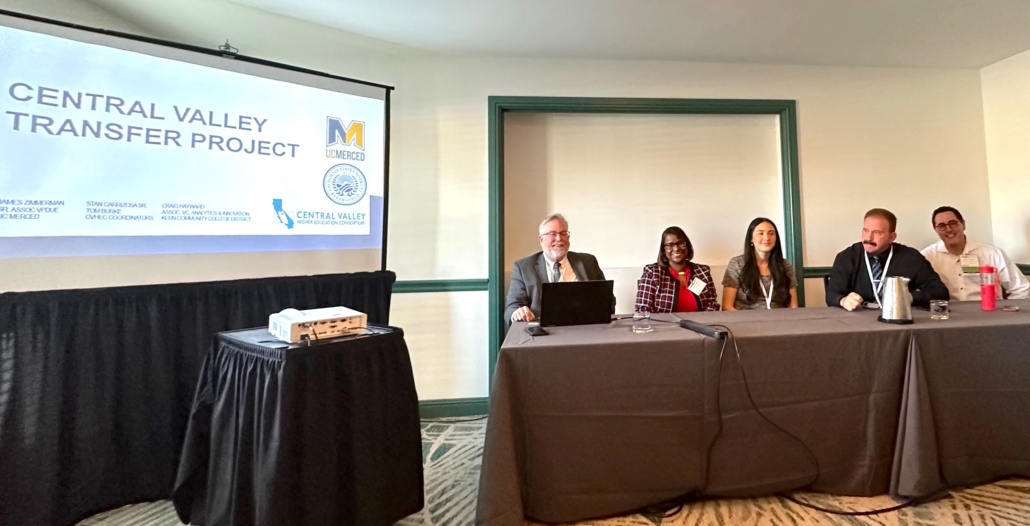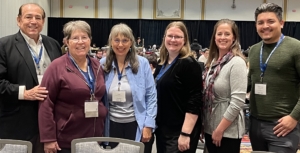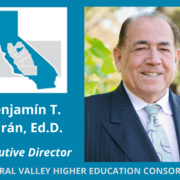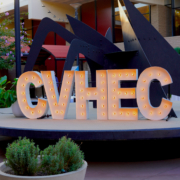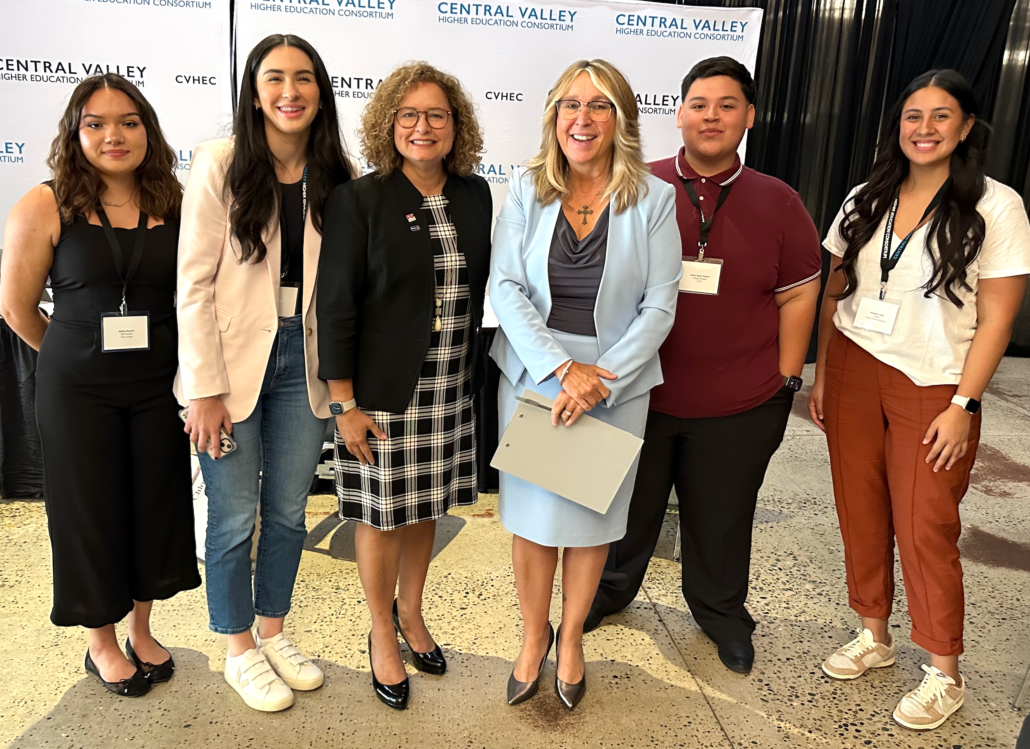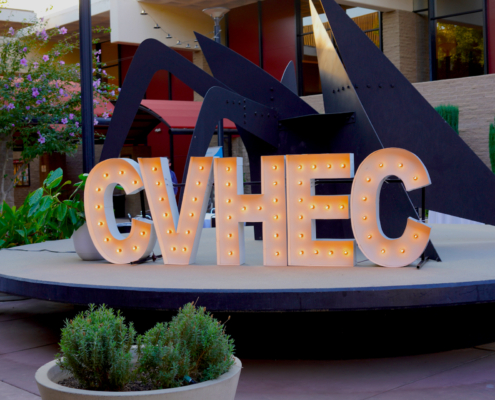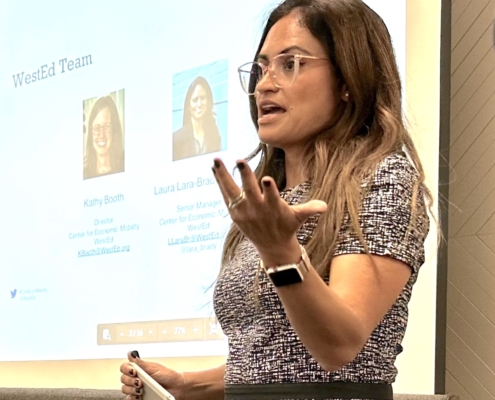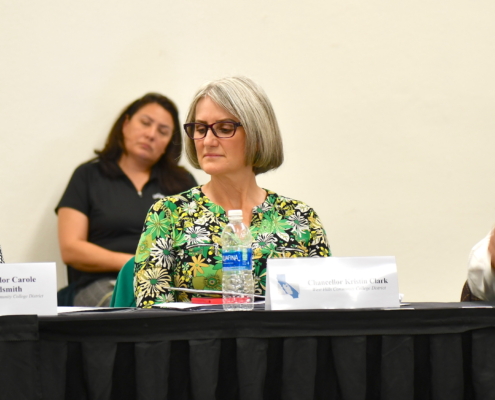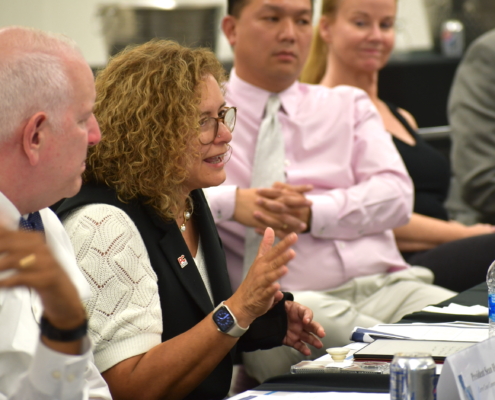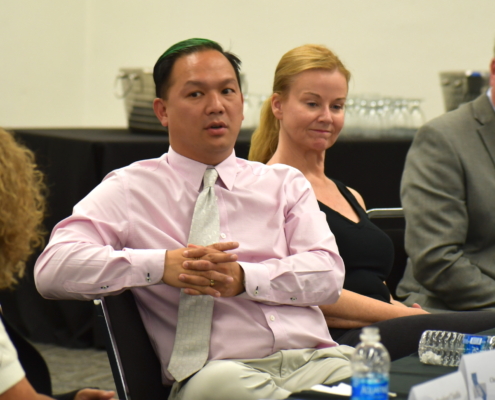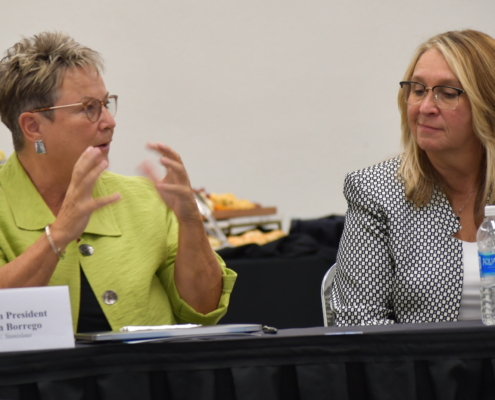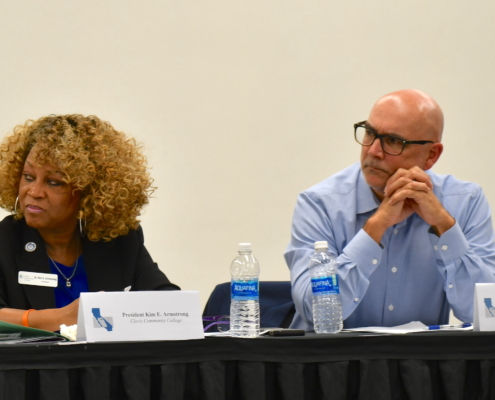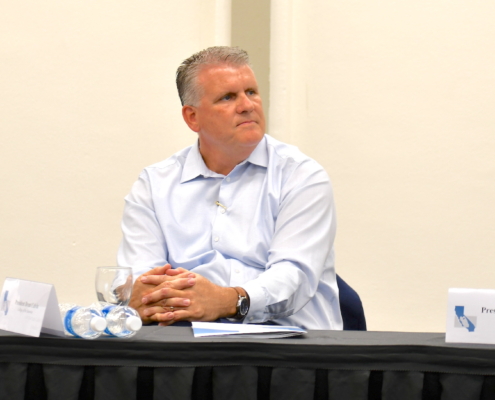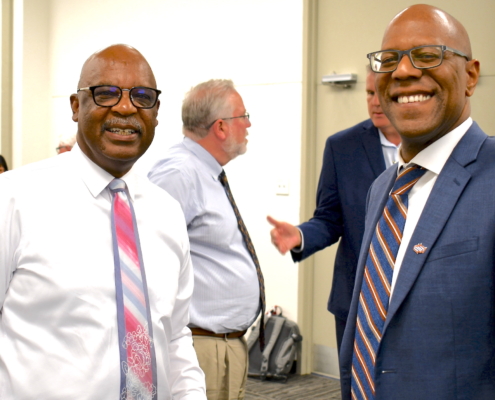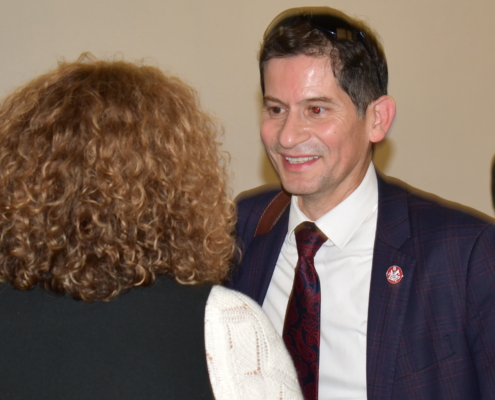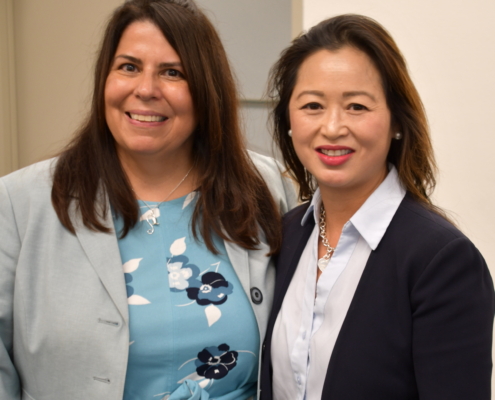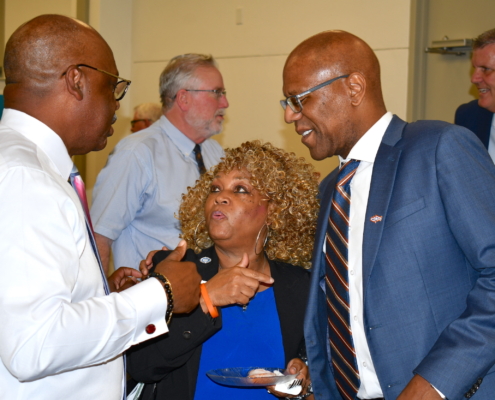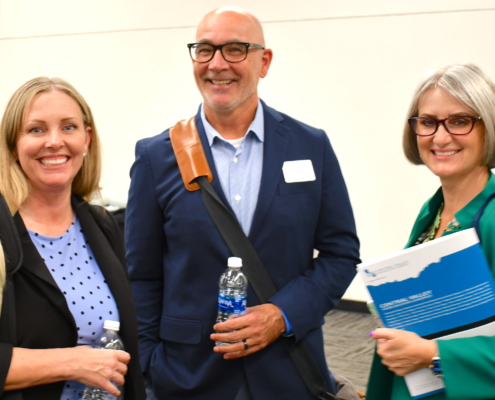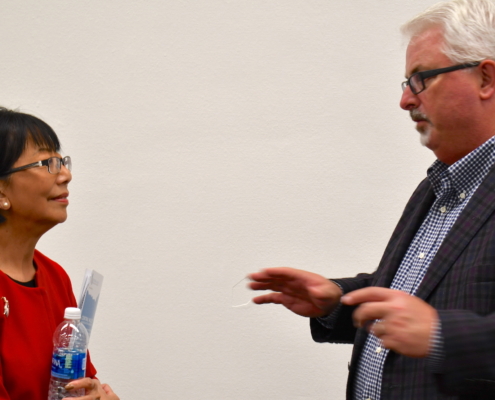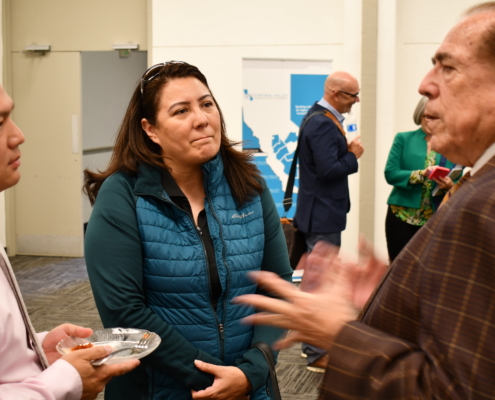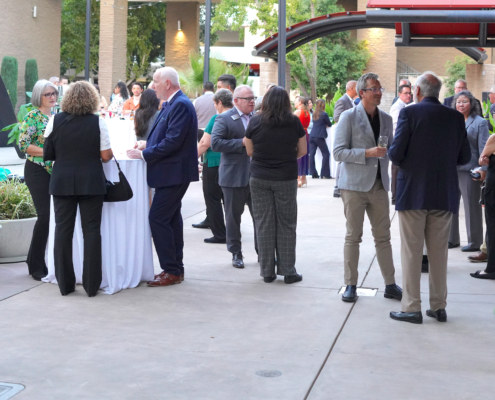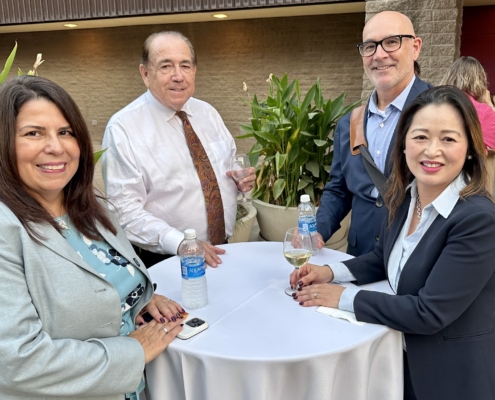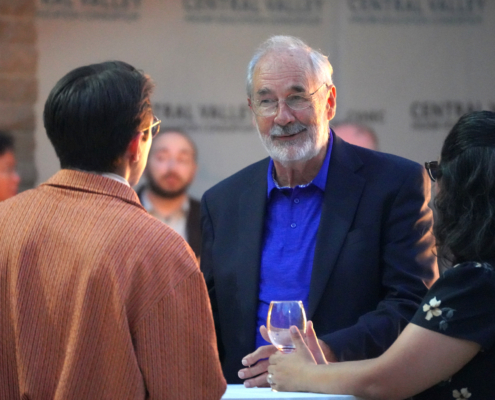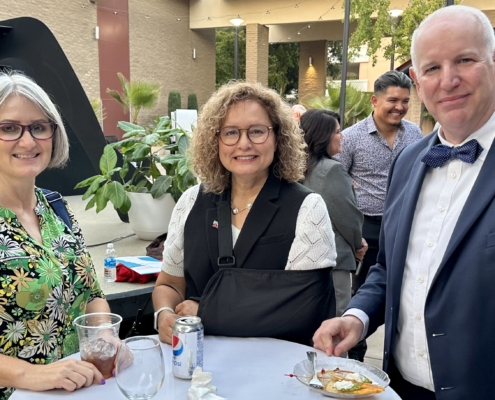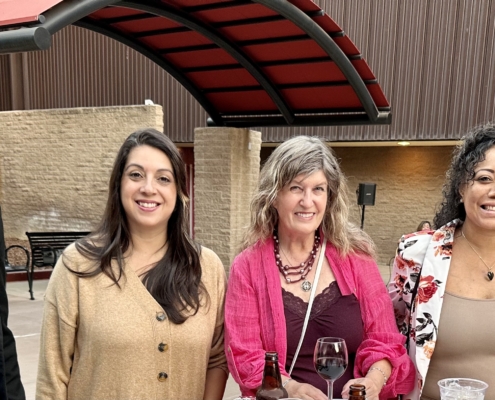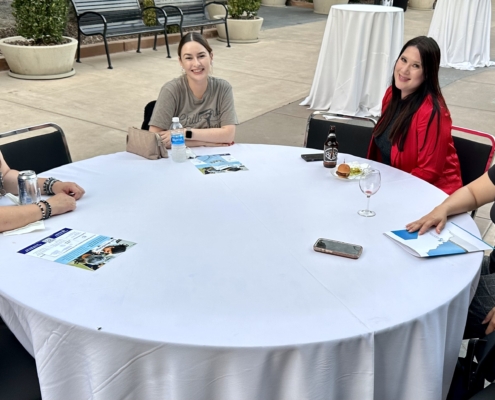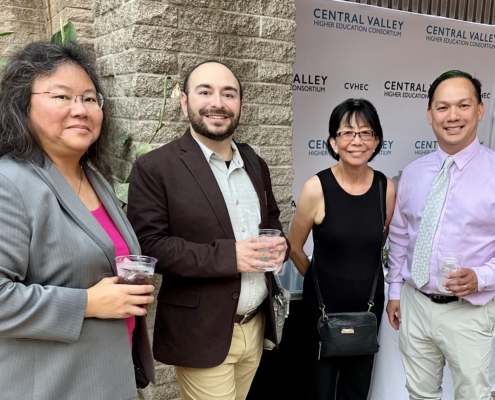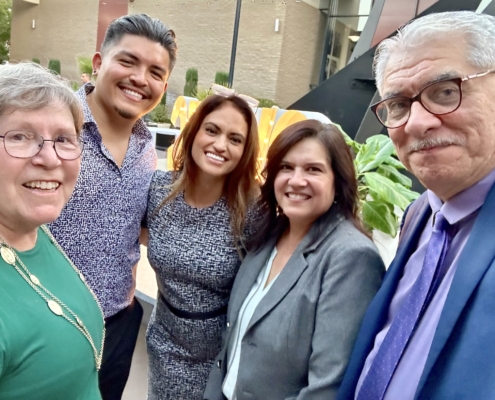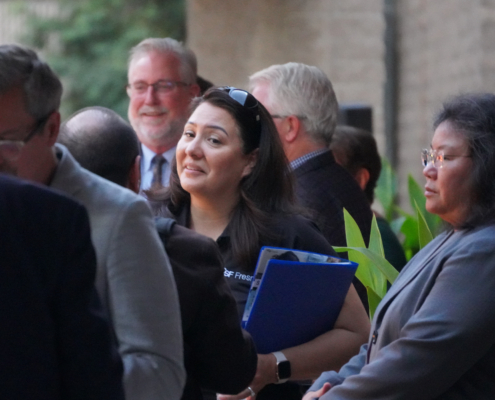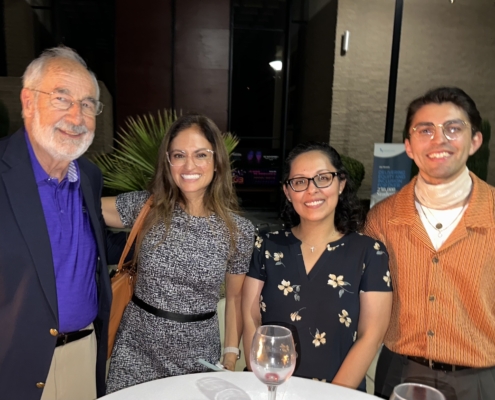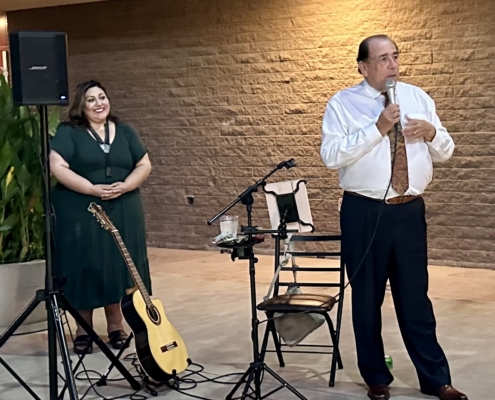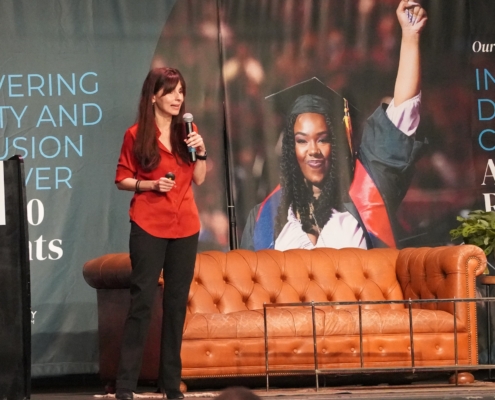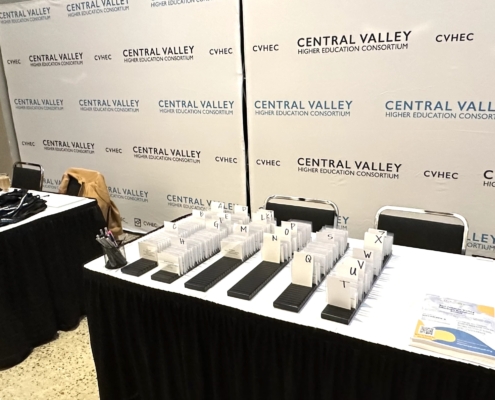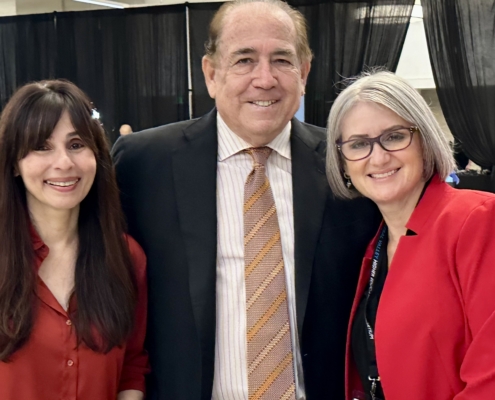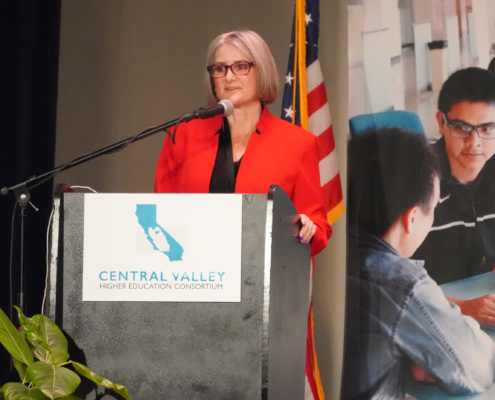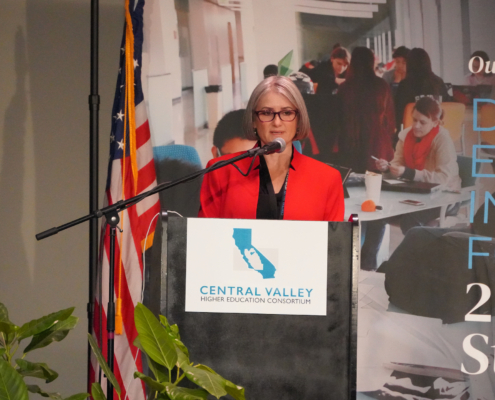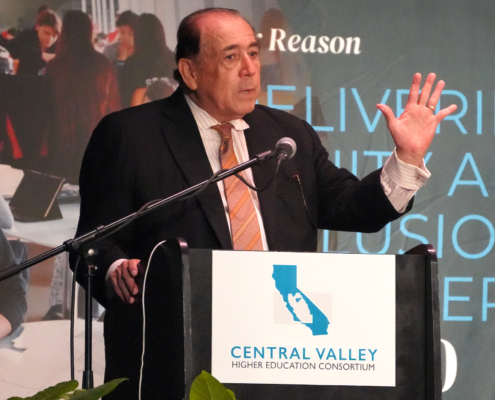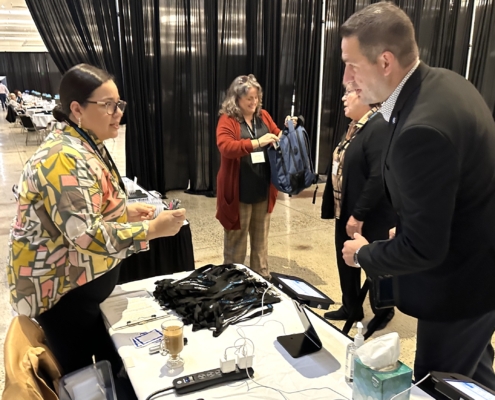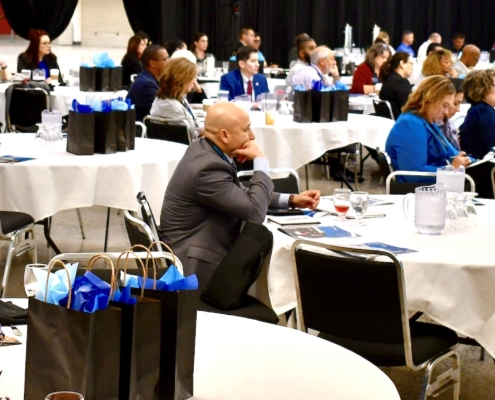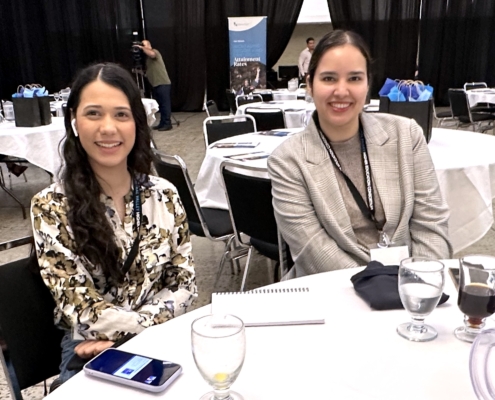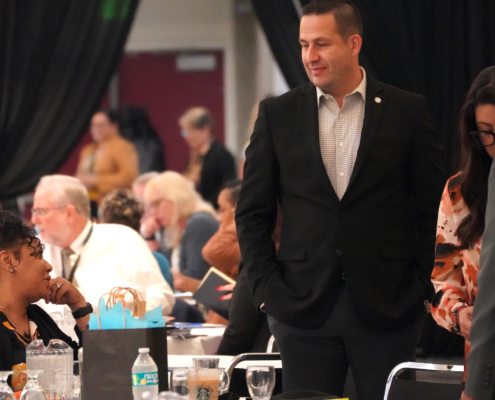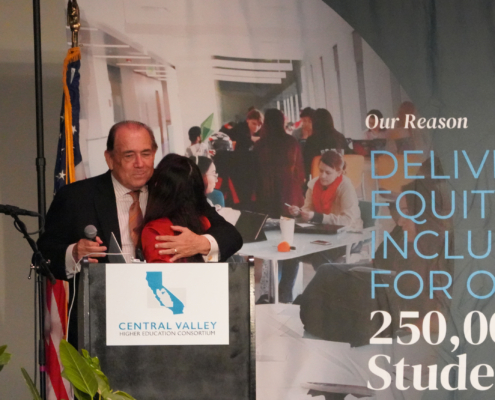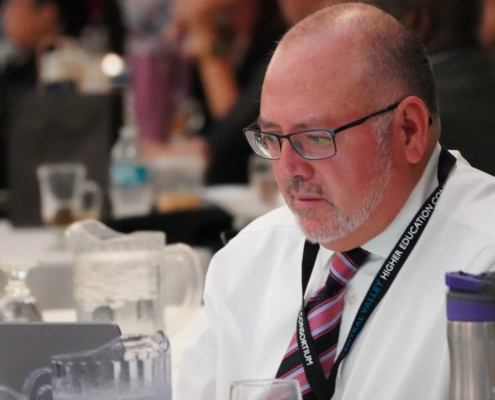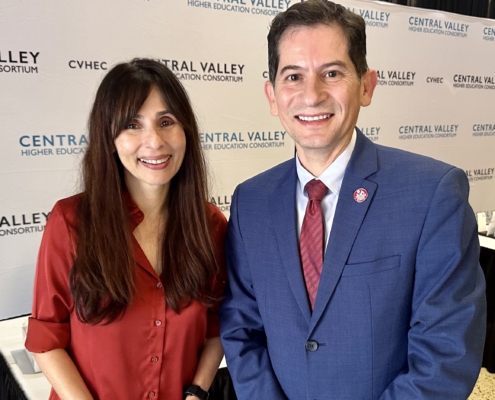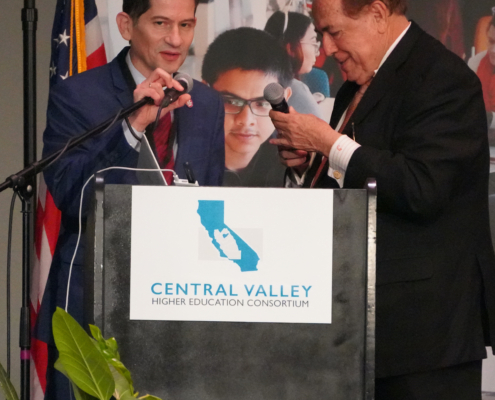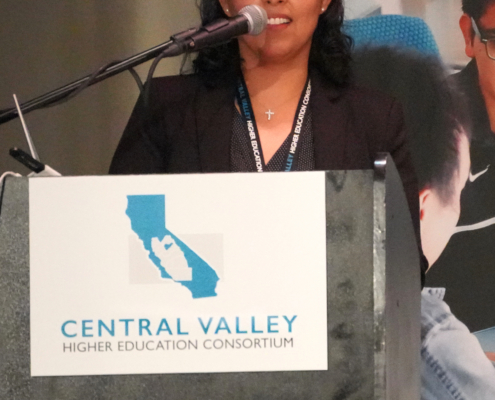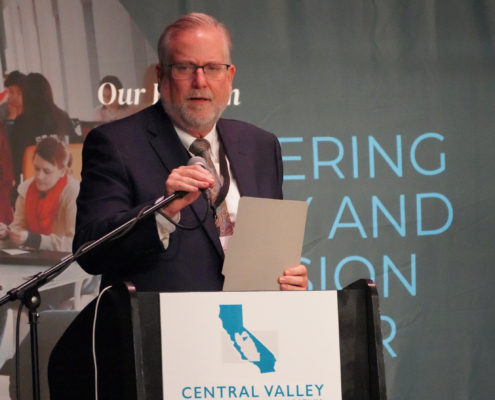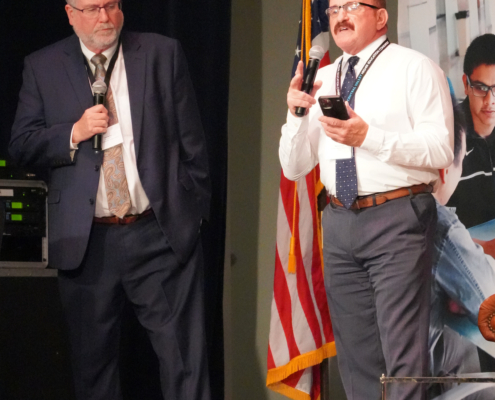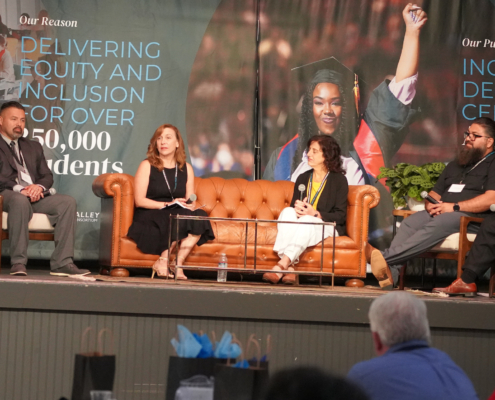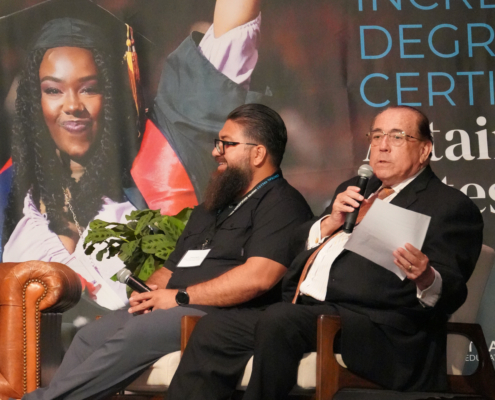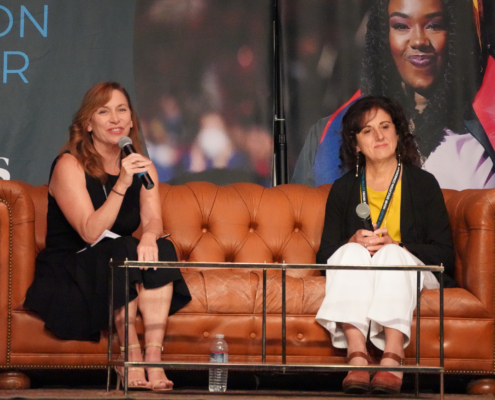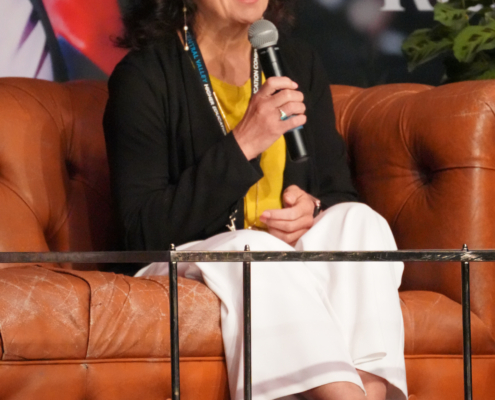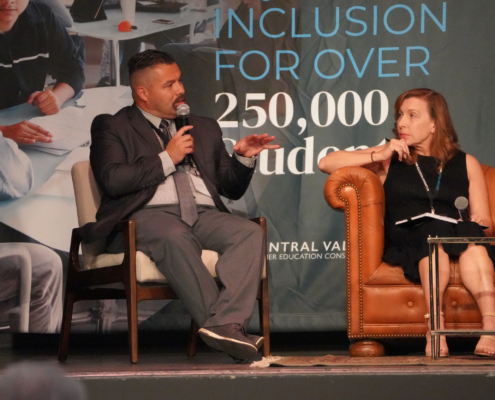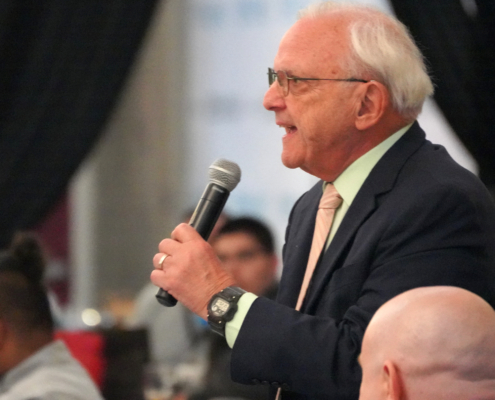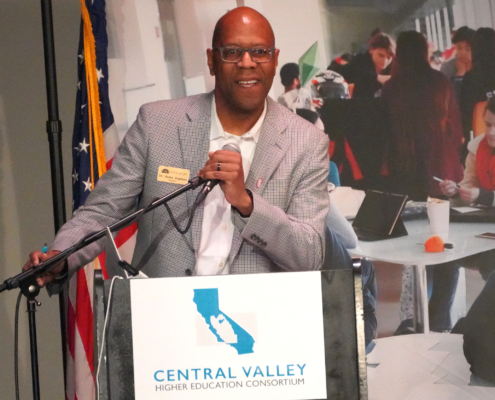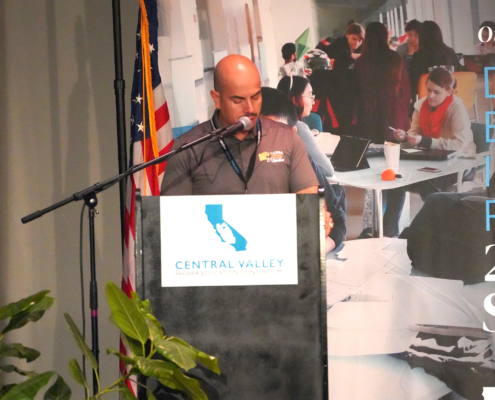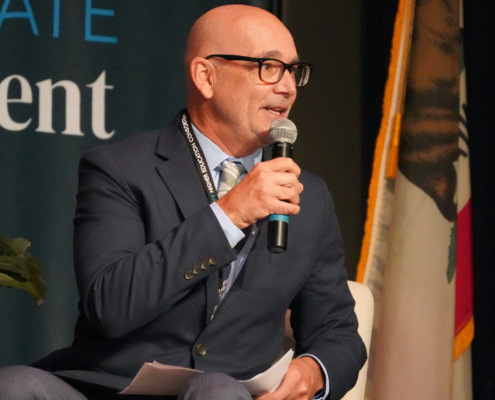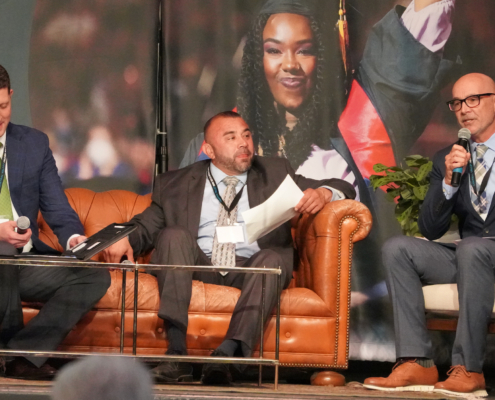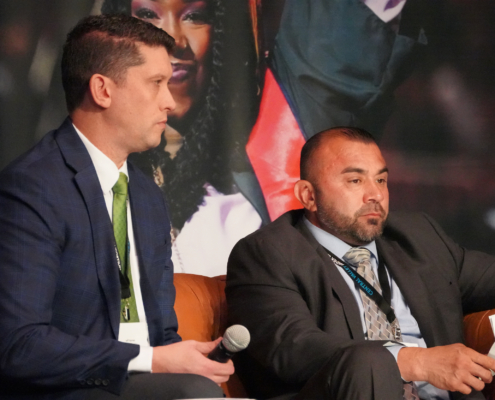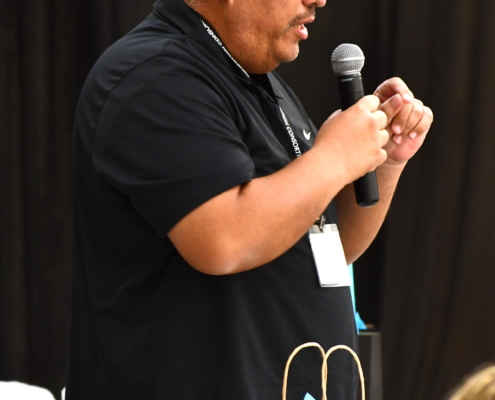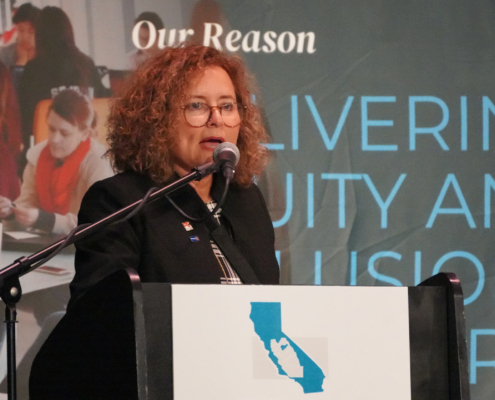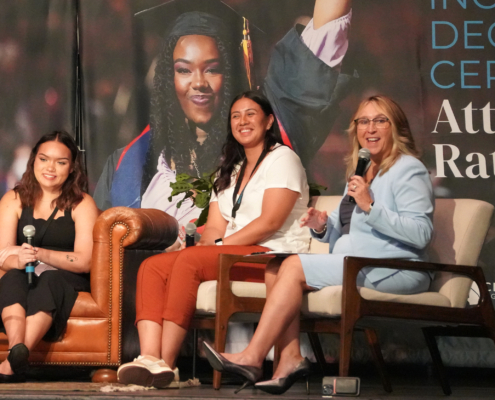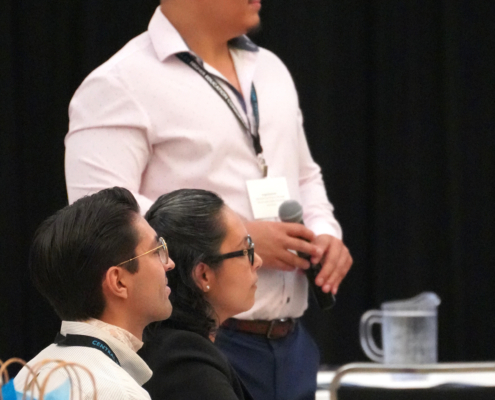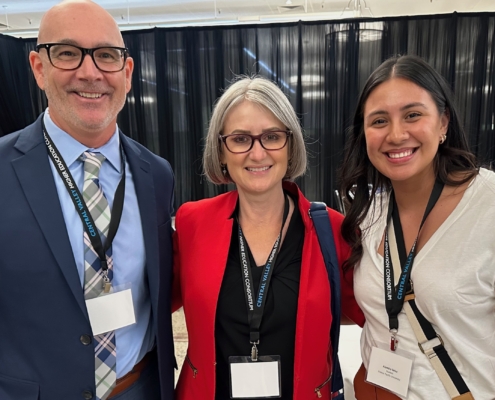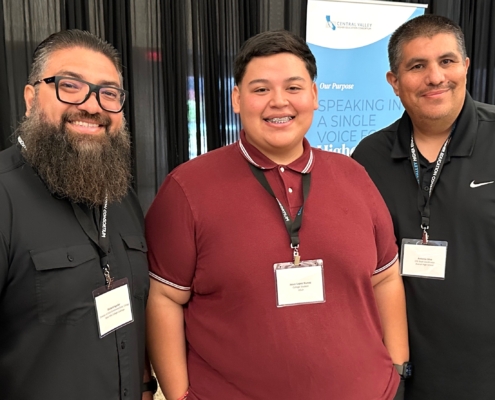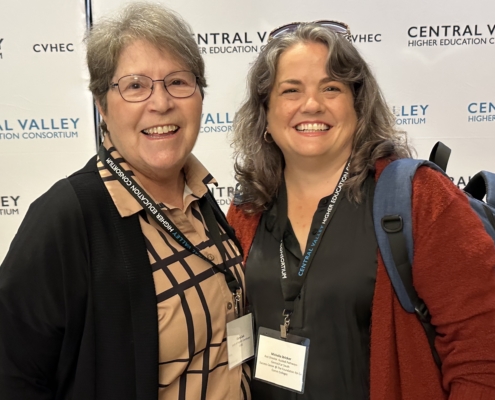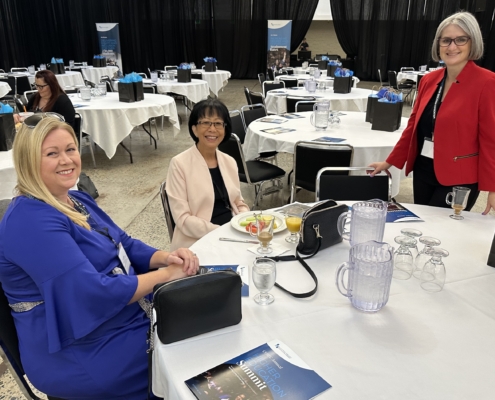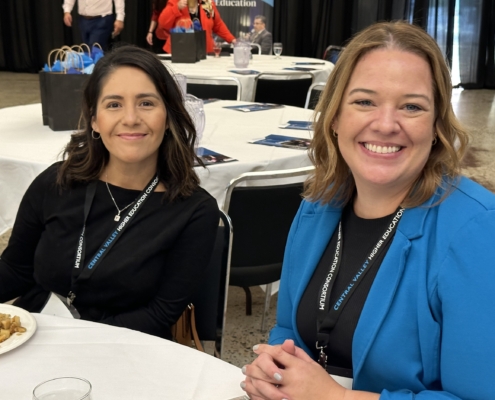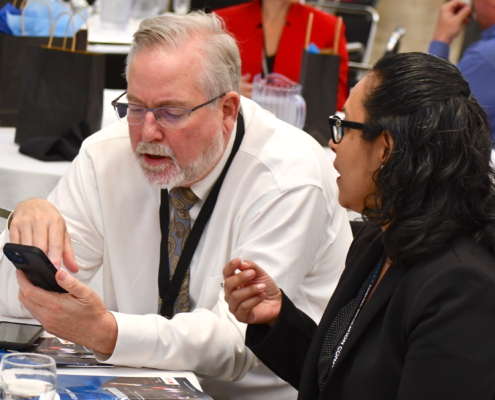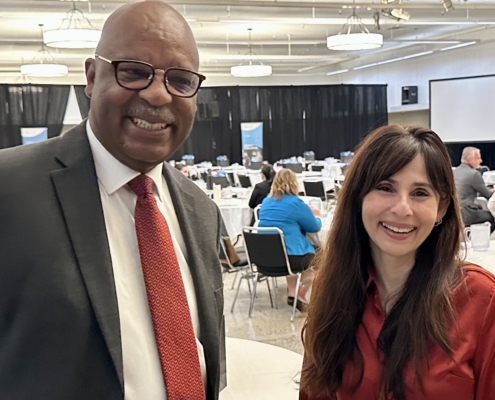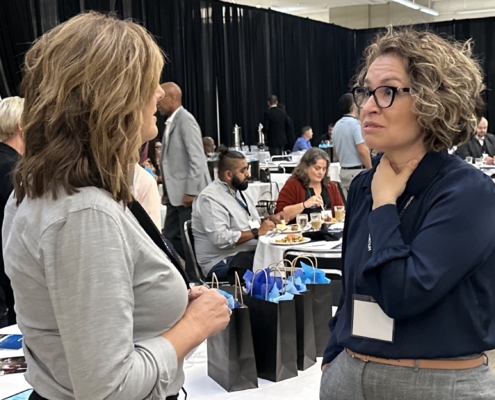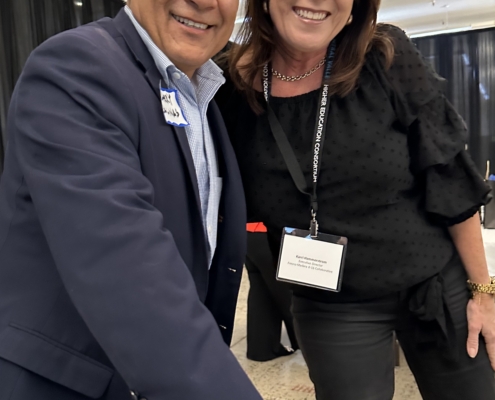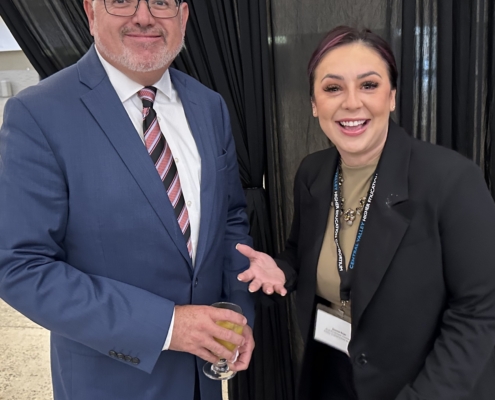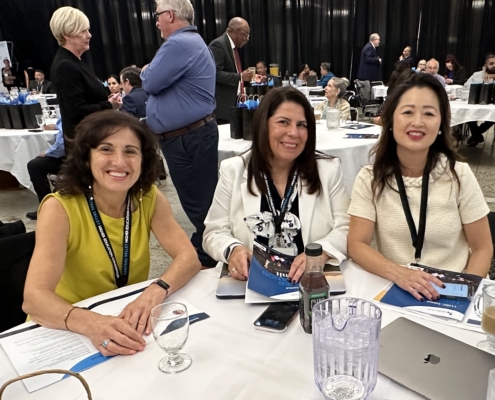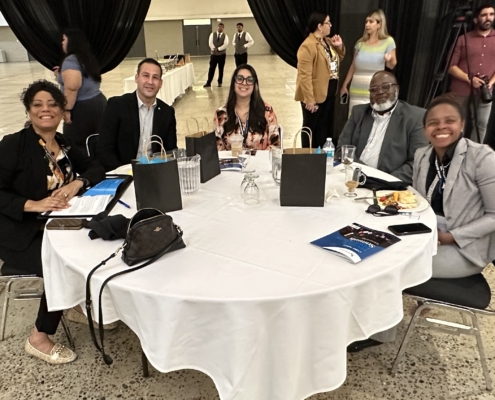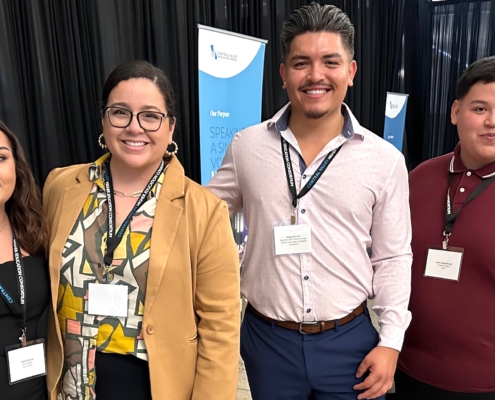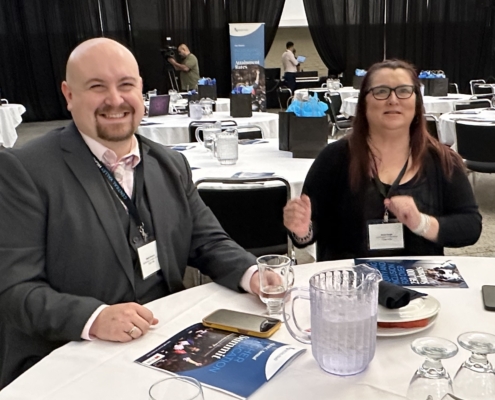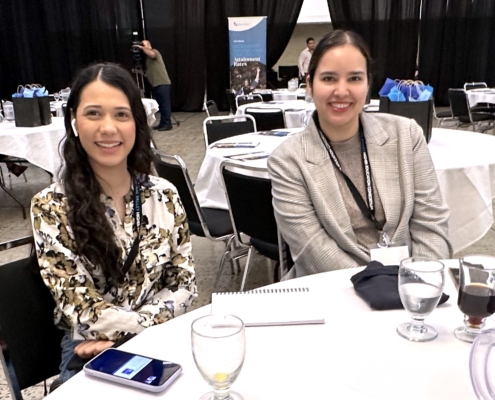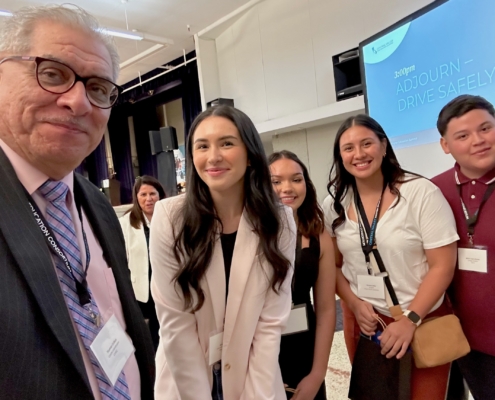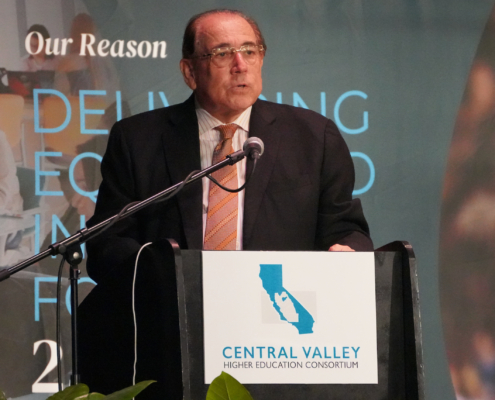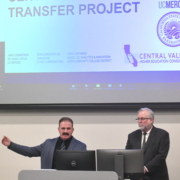MATH TASK FORCE: ‘Something extraordinary’ (Jan. 26 wrap)
Modesto Junior College math professor Tina Akers-Porter discusses her strand group’s deliberations at “The Central Valley Way to AB1705 Success” Convening Jan. 26 where a call for a “principals task force” by Orosi High School Principal Marlena Celaya would bring more secondary education voices to the table.
‘Something extraordinary is happening in math in California’s Central Valley’
Math Task Force latest AB1705 session leads to calls
for more data, high school input, re-convene April 19
BY TOM URIBES
CVHEC Media/Communications Coordinator
Realizing that state guidance surrounding Assembly Bill 1705 remains elusive, valley community college math educators and officials forged ahead at “The Central Valley Way to AB1705 Success” convening Jan. 26 in Fresno with a determined and unified mindset to develop implementation plans that will serve the best interests of their students including a follow-up session set for April.
In addition, the Central Valley Higher Education Consortium (CVHEC) Math Task Force discussion centered around five strands of curriculum planning for implementation before the law goes into effect July 1, two aspects emerged at the lively day-long work session: the increased participation of institutional researchers for pertinent data-collecting and a call for a “principal’s task force” to bring upper secondary education voices to the table.
Presented by CVHEC, the convening — the latest in a series of deliberations since fall — was attended by 82 representatives from the consortium’s 19-member community colleges, one high school principal and campus research professionals.
They agreed to reconvene April 19 for reports on follow-up work that will occur as a result of this most recent event. Registration for that event will open next month with additional details forthcoming.
Facilitated by the Charles A. Dana Center at the University of Texas at Austin, the session last month reviewed five strands of curriculum planning: Validating Prerequisites; Designing Precalculus for 2025; Math Support Outside and Inside the Classroom; Building an AB 1705 Campus Team; and Guided Self-Placement.
“With tensions high and little guidance surrounding AB1705, the 19 community colleges and districts that comprise the CVHEC nine-county region are rolling up their sleeves and getting to work on this math movement the ‘Central Valley Way’,” summarized Tammi Perez-Rice of the Dana Center.
Perez-Rice, who co-facilitated the event, said the convening was solely dedicated to working and planning at a regional and institutional level in two parts. The first part was dedicated to expanding the five work groups that emerged from the Nov. 17 webinar and creating a plan to move forward. The second half of the convening was devoted to institutional planning.
“The fruits produced from these convenings are already being felt around the region,” Perez-Rice said. “The plans and implementations emerging from these convenings are more than just a response to AB705 and AB1705; they cultivate systemic reforms that will benefit all students in the CVHEC region and beyond.”
John Spevak, CVHEC regional coordinator who oversees the consortium’s Math Task Force and co-facilitator of the Jan. 26 gathering, said in the short-term, the five strands work groups will continue to communicate and provide updates in preparation for the April 19 convening. The strand leads are preparing summaries of their Jan. 26 breakout discussions and member college teams are preparing summaries of the tentative plans they developed in the afternoon breakout sessions for oral reports in April.
“In the longer term, our Math Task Force will continue to monitor what the California Community College Chancellor’s Office says, while mainly going forward with our own Central Valley approach to the five strands.”
That “Central Valley Way” stems from the work undertaken by the CVHEC Math task Force, first formed in 2019, in the past year that was intensified with four work sessions beginning Oct. 6 in a virtual convening with CCC vice-chancellor Eric Cooper. The first in-person session followed Oct. 13 in Fresno and another virtual session was held in two parts Nov. 17 before the Jan. 26 session.
These sessions may represent the only concerted effort by a region’s community college math community actively meeting to collaborate across campus boundaries for ways to unite as one voice and determine a curriculum course of action that meets the law’s intent, Spevak said.
“We at CVHEC, along with the Dana Center representatives and our College Bridge partners in the Math Bridge Program, feel that something extraordinary is happening in math in the Central Valley of California,” Spevak said.
After the Jan. 26 session ended, Perez-Rice reiterated a point she made the first time she visited Fresno for the first in-person convening last fall:
“This collaboration today was amazing. As I travel and talk to math faculty all over the country, what I see pulsating from the CVHEC community here in Central California is just compassion; caring about their students; putting their students first; understanding what their students need; and more importantly collaborating with each other working across institutions to make things happen.”
Inviting secondary ed voices to ‘align syllabi’
A key development of the convening was the assertion and agreement that a crucial next step is “to involve high schools in the discussion and determine how to breakdown barriers between systems for a cohesive collaborative effort to put students first across the state of California,” a message delivered by Marlena Celaya, principal of Orosi High School who was the only secondary education official in attendance.
Celaya’s comments, first in a strand session and later in general comments before the assembled group, resonated with the community college professionals as she offered to lead a task force of principals/administrators who would unify with the CVHEC community college math educators for implementation strategy — to listen and hear what the needs are and how to meet those needs.
“I’m willing to lead this work because I don’t want people to go through the wars I went through teaching algebra and volunteering all my time,” said Celaya, a former math teacher at Dinuba High School. “We would want to hear from community colleges and say to them ‘what do you need?’
“We heard something from you today: ‘I want to know what courses are offered at the high school and what does that course description look like?’ Aligning syllabi is what I’d like to do,” Celaya said. “Mathematics is my passion.”
Perez-Rice said the April 19 convening promises more high school representation, with over twelve principals who are part of the Math Bridge Program by CVHEC and College Bridge being invited. Other secondary education officials from throughout the valley are welcome she said.
Participant feedback: ‘great to see we’re not alone in this …’
After the event, several participants shared their assessment of the Jan. 26 convening.
“The conversations were amazing and we really appreciated being here,” said Joshua Lewis, chair of the Bakersfield College Mathematics Dept.
“There have been so many legislative changes and so many unknowns it’s nice to see the work that other campuses are doing and realize that we’re not alone, that we have shared values; that we have shared emphasis on student learning and really care about doing right by all of our students,” he added.
Nathan Cahoon, Taft college math professor, felt that the efforts of CVHEC’s Math Task Force as exhibited at the convening is strengthening the voice of the valley’s math community which will have an impact.
“It was amazing to work with incredible professionals who have some really amazing ideas,” he said. “I know I took many good notes about ideas to implement at our college. The connections we are building here with each other will be powerful down the road as we build a cohesive effort to get some good research together that we can send to the state as one voice from all the colleges.”
Modesto Junior College math professor Marina Hernandez said coming together within the region is relished because when attending other statewide or national conferences, the focus is not as localized.
“It was very helpful to learn what other colleges in the Central Valley are doing because we share similar student population and resources characteristics and their best practices are applicable to us here in our region,” Hernandez said.
Tina Akers-Porter, Modesto Junior College math professor, said the Math Task Force work has helped her better understand what AB1705 is and what it means for her students.
“I feel like I have a better understanding of some of the challenges of the legislation and what others are worried about,” she said. “We share some of those worries but it’s great to hear different points of view on that. A byproduct of this is we are seeing how we need to support underprepared students more, inside and outside the classroom, and sharing ideas to do that.”
Shelly Getty, Taft college math faculty and a strand leader, echoed Akers-Porter: “We left knowing we are going to start some specific tutoring and targeting students for tutoring. We will try to advertise it better and recruit so students get more access to the services we already provide which will greatly impact them. We shared some good ideas on how to do that effectively.”
Marissa Martinez, Taft college math professor, said, “We have our work cut out for us. There’s a lot of things that we have to address with a lot of moving parts. Everything keeps changing but it was great to be able to see that we’re not alone in this, that we’re working together to better serve our students.”
She said this intercollegial collaboration and the feedback from the colleges helps “so we don’t have to reinvent the wheel — what worked, what didn’t work.”
Next steps? Data research
“I would say the next step is collecting our data to see how the numbers show where we are so we can prove that these courses are important for our student success,” Martinez said.
This data aspect was also a key part of the convening as institutional research professionals were invited and directly participated such as Arooj Rizvi, research analyst in the Office of Institutional research and Effectiveness at San Joaquin Delta College.
“Researchers have a monumental role in the implementation of AB 1705 because policymakers are going to depend a lot on what we are able to produce as a group or even as an institution,” Rizvi said. “Being a part of these conversations helps us to see the bigger picture, the context and the requirements of what exactly it is that we are looking for in the data.”
She said it was exciting to hear at the convening what area colleges are going through.
“I realized how similar our challenges are from institution to institution, “she said. “Working through that together and being solution-oriented is something that’s going to take all of us towards a beneficial direction. Seeing us all here today was a defining moment in history.”
Owynn Lancaster, vice president of academic strategy for CVHEC partner College Bridge, said the event was “a huge success seeing folks come together from math to talk about math and really pool their resources to address actual challenges.
“The most powerful focus of change in education is always the educator,” Lancaster said. “I know everything’s heaped on them but in a lot of ways they have the greatest power of the greatest agency for this.”
For more info: centralvalleyhec@gmail.com
For CVHEC media inquiries: Tom Uribes – cvheccommunications@mail.fresnostate.edu (or text 559.348.3278).
See also:
https://bit.ly/MTFconveneKSEE24
Valley’s math ed experts unite to address AB 1705 challenge for student success
The CVHEC Way to Math Success — Implementing AB1705
Math Task Force begins discussion of AB1705 implementation – Nov. 17 next
CVHEC Math Task Force meets in-person Oct. 13 for AB 1705 follow-up
NEWS RELEASE – CVHEC Math Task Force: Impactful legislation (AB 1705) Convenings Oct. 6 & 13
CVHEC Website Feature: Math Task Force Page
PHOTO GALLERY
Central Valley Transfer Project: valley’s four-year colleges collaborating
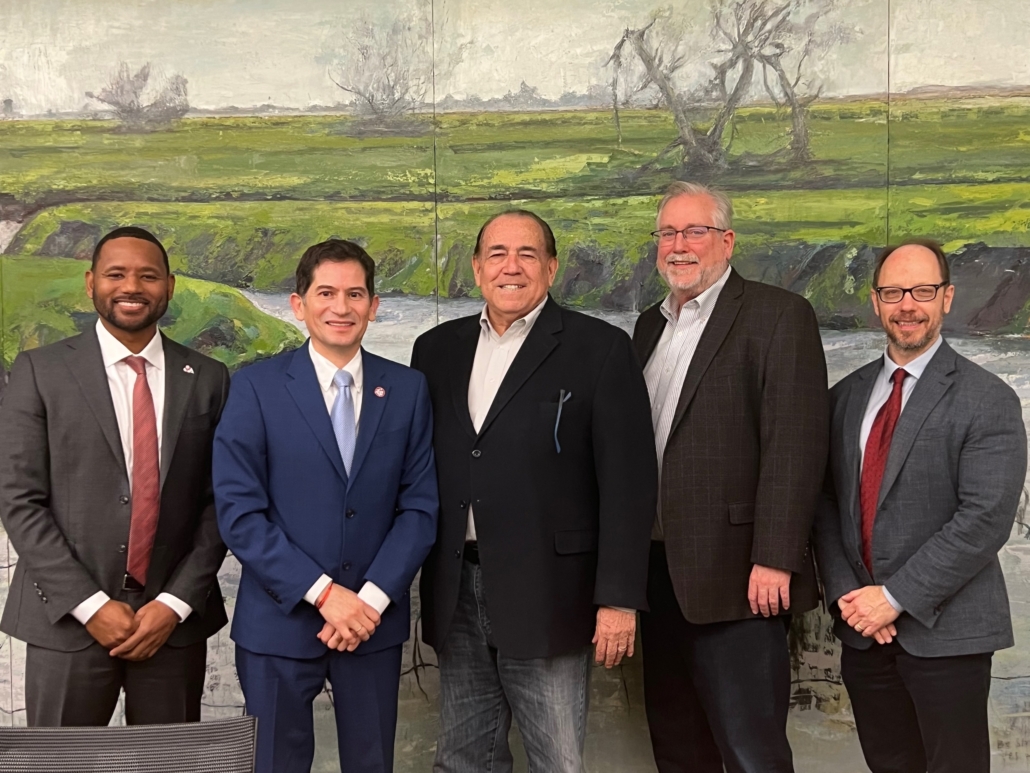
Fresno State, a founding CVHEC member, joined CVHEC’s historic Central Valley Transfer Project in January with (from left): Dr. Kent Willis, vice president of Fresno State Student Affairs and Enrollment Management; University President Saúl Jiménez-Sandoval; Dr. Benjamin Duran, CVHEC executive director; Tom Burke, CVHEC regional coordinator; and Dr. Sergio La Porta, associate dean of the Fresno State College of Arts and Humanities.
Fresno State joins in transfer ‘centerpiece’ with
11 CVHEC community colleges, 3 CSUs, UCMerced
The Central Valley Transfer Project is now partnered with the region’s three California State University campuses after Fresno State signed on in January joining Bakersfield and Stanislaus in the historic Central Valley Higher Education Consortium initiative designed to open new doors for students’ successful transfer from community college.
Along with founding partner University of California, Merced, this means the valley’s four public institutions of higher education are working in unison with 8 community colleges currently through CVHEC’s project using the groundbreaking Program Pathways Mapper software. The project has also gained the full support of the California Community College Chancellor’s Office.
The community colleges already in the CVTP, with several more expected to sign on this year, are: Bakersfield College, Clovis Community College, Madera Community College, Merced College, Porterville College, Reedley College, West Hills College-Coalinga and West Hills College-Lemoore.
The Transfer Project is also expanding participation in the north end of the Central Valley with Modesto Junior College, Columbia College and San Joaquin Delta College scheduled to begin onboard this spring for a total of 11 community college partners said Stan Carrizosa, CVHEC regional coordinator and consortium lead for the project.
All Transfer Project partners are members of the consortium with their respective chancellors and presidents serving on the CVHEC Board of Directors.
“The Transfer Project is now a centerpiece for students to both enter and transfer from community college to their four-year universities,” said Dr. Benjamín Durán, CVHEC executive director. “We are excited to share this latest progress of the project which has been featured statewide and nationally at conferences such as the Community College League of California and Complete College America.”
He added, “This innovative approach is the only one in the state that includes a University of California campus collaborating with partner California State University and community colleges in establishing transfer pathways for Central Valley students to get them to and through college in a timely manner.”
Dr. Saúl Jiménez-Sandoval, Fresno State president and CVHEC board member, said, “I’m proud that Fresno State will be a dynamic partner in the Central Valley Transfer Project, as this pathway will empower community college students to become visionary Bulldogs.”
The Fresno State agreement was finalized Jan. 17 between Durán and President Jiménez-Sandoval, with Tom Burke, CVHEC regional coordinator and Transfer Project team member; Dr. Kent Willis, vice president of Enrollment Services; and Dr. Sergio LaPorta, associate dean of the College of Arts and Humanities.
At CVHEC’s Higher Education Summit last fall, CCC Chancellor Sonya Christian announced that the statewide system has designated the Transfer Project as a demonstration project as set forth in her Vision 2030 for all California community colleges. The Transfer Project’s participating community colleges are serving as the pilot campuses with plans to implement statewide.
Carrizosa said the state budget continues to support and fund the onboarding costs for all community colleges to subscribe to the Program Pathways Mapper.
Established in 2021 with UC Merced, Merced College and Bakersfield College, the project is designed to open new doors for students to successfully transfer from community college with its Program Pathways Mapper, Carrizosa said.
He said the Program Pathways Mapper — a public facing, internet-based app that can be downloaded and accessed by the public software platform — provides unprecedented ease of access for students, counselors, advisors and parents much more so than other existing platforms.
“There are no typical requirements for access to PPM such as other internal college systems like Degree Works, Assist.Org and the CSU Transfer Planner,” he said. “These are all course tracking systems but in order to use them, students need to be successfully enrolled in college and have a student email address or other form of login to try and plan. Through PPM students simply upload the public PPM app to their devices and have immediate access.”
Carrizosa said the PPM helps simplify the transfer planning process which can be the most difficult task for many students.
“In much of our Central Valley region, as many as seven out of 10 incoming college freshmen will be first generation students to attend college,” he said. “Research shows that the most difficult task for them is often the application process itself and completing the required steps for enrollment. Systems like Degree Works and others do nothing to remove this common barrier because these systems cannot be accessed until a student successfully enrolls.”
He explained that a high school student can start the Transfer Project journey as a junior or senior by enrolling in college dual enrollment courses enabling them to complete their transfer level English and Math courses while still in high school. These units roll up with them as they enter community college and track the completion of their lower division requirements for their Associate Degree for Transfer in their chosen major via PPM.
“Students can easily select a community college they wish to attend and a major they want to pursue and the lower division courses required are sequentially laid out for them through the Program Pathways Mapper software.”
In addition, the PPM then links those lower division courses to an upper division institution of the student’s choice and shows a clear sequence of upper division courses needed to complete the degree, Carrizosa added.
“The PPM contains clear and accurate information directly from course catalogues from all participating colleges,” Carrizosa said. “The Central Valley Transfer Project is becoming an alternative continuum of courses to the traditional high school A-G or Career Technical Education continuums and is unprecedented in the state’s community college system. We call it ‘The Central Valley Way!’”
“Through the use of PPM, students complete exactly what is required of them to successfully transfer to their four-year university and they follow PPM through their last two years to degree/certificate completion,” Carrizosa said.
Baseline data results also demonstrate the promise that PPM delivers in the Transfer Project.
In a sample of 5,000 incoming freshmen to Bakersfield College in 2022 the students using the PPM increased their “percentage of on-path course completion” to over 80 percent which also closed the equity gap in this statistic for ethnic minority students when compared to their white counterparts, Carrizosa said.
“The same sample showed students using the PPM reduced the ‘number of units-to-degree’ from an average of 87 down to 67,” he added.
The project is now gearing up to expand the partnership with the College Bridge Math Project and to onboard community colleges from the northern region of the Central Valley.
For more information about the CVTP, contact Carrizosa at centralvalleyhec@gmail.com.
CVHEC media inquiries: Tom Uribes – cvheccommunications@mail.fresnostate.edu or text 559.348.3278.
Fresno State media inquiries: PIO Lisa Bell – lbell@csufresno.edu.
See:
· Pilot CVHEC/UC Merced Transfer Project improves process for students
· CVHEC Web Site Feature: Transfer Project
· Historic Transfer Project spurs statewide movement to increase transfer rates
· HIGHER ED NEWS: College Bridge to expand Math Bridge; CVHEC Transfer Project
• A-G
WHAT THE CV-HEC IS HAPPENING BLOG (January 2024): CVHEC 2023 — surging forward for Central Valley students
To kick off our 2024 “What the CV-HEC is Happening” Blogs, CVHEC Regional Coordinator Stan Carrizosa, Sr. follows up the year-in-review published in our December newsletter issue by offering a perspective of the consortium’s progress in 2023 that sets the stage for a productive new year. Carrizosa, who is president-emeritus of CVHEC member College of the Sequoias and an integral part of the CVHEC team, serves as the lead for the consortium’s Central Valley Transfer Project. The CVHEC blog features perspectives about the higher education community and issues. Submissions are welcome for consideration: Tom Uribes, cvheccommunications@mail.fresnostate.edu.
Propelling successfully, purposefully like a guided rocket
BY STAN A. CARRIZOSA, SR.
CVHEC Regional Coordinator
(President-emeritus, College of the Sequoias)
As a child, I remember watching a weekly science show called “The Undersea World of Jacques Cousteau” that explored the ocean and marine biology.
One fascinating episode depicted how an octopus at any moment could be moving wildly with all eight legs and not advance at all. But once the octopus contracted its core by simultaneously snapping all eight legs in the same direction, a burst of air coming from the fish propelled it successfully and purposefully through the water like a guided rocket.
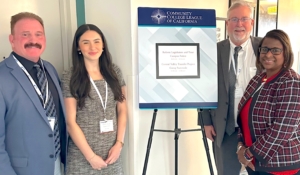
Stan Carrizosa, Sr. (left) and CVHEC Central Valley Transfer Project team partner Tom Burke presented at the Community Colleges League of California in November along with UC Merced grad student Araceli Tilley who discussed her success with the project’s Program Pathway Mapper software and Jennifer Johnson of the Foundation for California Community Colleges (right).
Over the course of the past 12 months, CVHEC has flexed its octopus legs and undertaken otherwise separate projects like Math Bridge and Master’s Upskilling (dual enrollment) and the Central Valley Transfer Project. By aligning them and their sub-parts, CVHEC has achieved the snapping of its octopus legs successfully surging us forward in the form of real achievement results for higher education in the Central Valley and for our region’s students specifically.
As we move into 2024, the work of CVHEC continues to be more aligned in ways that leverage each element and make the wholistic effort more cohesive and successful. This reminds me how effective it was to do this same thing as a college president. It was important to have clear goals and objectives and planned actions designed to address specific aspects of an issue to ensure greater success.
This past year, CVHEC acted like an organization with big-picture goals for improving student achievement region-wide and a measured plan of actions all designed to work together as a system to achieve success.
The two key drivers of this system for CVHEC success are strong intersegmental partnership commitments to:
- a robust dual enrollment;
- increasing successful community college transfers to higher education institutions.
Biggest DE challenge: qualified instructors
Armed with direct feedback from our first Dual Enrollment Summit held three years ago, we heard that one of the biggest challenges to implementing dual enrollment courses was the ability to find qualified instructors to teach college courses on high school campuses.
CVHEC responded by creating an upskilling project where high school teachers in math and English could earn a master’s degree in their content areas and be qualified to apply for and teach dual enrollment college courses on their high school campuses.
Early results from dual enrollment courses showed that students were more successful when the teacher for their college courses was a member of their regular high school faculty. Under the leadership of Dr. John Spevak, CVHEC regional coordinator and vice-president emeritus of Merced College, who facilitated an impressive package offering high school teachers the opportunity to earn a MA degree in their content areas through our partner universities, this opportunity had many residual benefits such as:
- improving the quality of teaching for their high school classes,
- earning higher salaries at their high school,
- creating a professional learning community between high school and community college teachers,
- and most importantly, changing teacher attitudes about the ability for high school students to succeed in college-level work.
The benefits for high school students are enormous.
Those enrolled in college dual enrollment courses experience pass rates of 80-plus percent while mainstream college students pass rates are in the 50 percent range. Finally, dual enrollment has proven to be a game-changer for first-generation college students in closing the equity gap among them and their college prep peers.
If students are able to take their college math and English courses before graduating high school, they start their college career on a level playing field by having completed their first required courses in transfer-level math and English. This enables them to get on the right pathway and stay straight toward their degree completion.
Incentivizing the efforts to increase transfers
The second key driver for CVHEC in 2023 and moving into the new year is the Central Valley Transfer Project!
The breakthrough moment in this project came when UC Merced agreed to review the CSU ADTs and approve these lower-division sequences as meeting the requirements for successful transfer to UCM. Central Valley CSU’s including Bakersfield and Stanislaus have bought in to the Transfer Project as well. Over the past three years CVHEC has worked to complete implementation in eight of our CV community colleges with three more joining the project this year.
Again the student benefit stands clear: early results show that students in the Transfer Project increase their percentages of on-path course completion each semester by 20 points to 80-plus percent. The same students also reduce their number of units to degree from a high of 85 down to 62.
Meanwhile the new statewide Student Funding Formula starts to provide enhanced per/FTES revenue for successful transfers to four-year institutions, further incentivizing the efforts to increase transfers.
We know that of all the successful graduates earning degrees from CSU’s, 50 percent started their education at a community college. Most recently, California Community Colleges Chancellor Dr. Sonya Christian unveiled her VISION 2030 which includes the Central Valley Transfer Project as a Demonstration Project for the entire state. As a result, CVHEC is now being recruited in both southern and northern California to share the success of the CV Transfer Project with those regions through presentations at various convenings.
Thoughtful and effective continuum creating unprecedented leverage for success
In summary, in addition to tracking and assessing our efforts as individual projects, it is equally if not more important to step back and see the bigger picture in the CVHEC body of work for 2023 that sets the stage for promising 2024. We can see there is a thoughtful and effective continuum that links these efforts together creating unprecedented leverage for success:
- CVHEC started by looking at the data and listening to the practitioners in the field to develop an agenda of work to support our colleges.
- Dual enrollment shows great promise but needs more qualified instructors.
- High school students in dual enrollment courses can close the equity gap between them and their peers thus advancing their personal confidence and capacity to succeed in college.
- Most higher ed students start in our community colleges and now through the Transfer Project they have a clear pathway of courses to take for a successful transfer to four-year universities.
- Once our community college students successfully complete their transfer, statistics show that they represent 50 percent of all university graduates.
So, looking back over the past 12 months, CVHEC – like the octopus snapping our legs to successfully surge forward – has successfully linked together major initiatives to build upon and strengthen each other allowing students to experience a continuum of effectiveness and success in achieving their higher education goals and objectives. To close out 2023 and look ahead, our executive director Dr. Benjamín Durán sums up the CVHEC spirit best in his newsletter director’s message published in our December issue:
“This year we are happy to salute and greet our K-12 partner districts who have joined us in creating meaningful pathways from middle school and high school to college. As we prepare to welcome 2024, stay tuned as we continue to nurture many roads leading to one destination – getting students to and through college in a timely manner!”
CVHEC’s Year-In-Review 2023
Many strands coming together into one fabric
— a glimpse at the past 12 months
By CVHEC TEAM
(Tom Uribes, Dr. John Spevak and Stan Carrizosa)
The Central Valley Higher Education Consortium completes our 21st year with this 2023 Year-In-Review as seen through the headlines of our monthly e-newsletter, now in its 35th edition. (A special summer edition covers June-August).
While much was accomplished the past 12 months, perhaps our main achievement was a combination of many accomplishments, with the CVHEC team working simultaneously on many strands that come together into one fabric. We have remained committed to building a road to educational and career success for all students, especially those in grades 9 to 14, by continuing to focus on efforts with these major strategies throughout 2023:
- For community college transfer students, we expanded our Central Valley Transfer Project and its Program Pathways Mapper software, inspiring the California Community Colleges to adopt the program as a demonstration project for possible system-wide implementation in the future;
- For high school students, we have encouraged the ongoing growth of dual enrollment, most notably by partnering with College Bridge to help initiate and develop the Central Valley Math Bridge Program involving many of our community college members and their respective feeder high schools as well as expanding our Master’s Upskilling Program initiated two years ago into Kern County;
- We are fostering a Central Valley approach to the understanding of Assembly Bill 1705 through our English and Math Task Forces that are now in full swing with an eye to a productive 2024 and the implementation of this legislation that focuses on student success in math and English.
On a broader state and national scale, we closed the year this month with two major conferences: the Talent Hub Convening in Mobile, Alabama by the CivicLab where we revisited how partnerships between industry and education, working off the same playbook, are vital to cross-collaboration success for both landscapes; and the Complete College America conference in Las Vegas, Nevada where we explored “a clear-eyed vision for leading systems change” in higher education throughout our nation.
See this look back at the CVHEC 2023 story:
JANUARY
In January, we announced that the Dual Enrollment Math Bridge Project — a partnership between the Central Valley Higher Education Consortium, College Bridge and the Rand Corporation — was awarded a five-year $4 million federal grant in late December. The project, with a total budget of $6.7 million, involves six CVHEC community college members providing college-level math classes at 21 rural high schools that will improve and support college readiness for underprepared students in those colleges’ respective service areas beginning next fall. UPDATE: A kickoff for the participants has held in May. The participating CVHEC colleges are: Cerro Coso, Columbia, Madera, Reedley, Taft and West Hills College Coalinga.
‘First of its Kind’ CVHEC Transfer Project Gaining Statewide Interest
The CVHEC Transfer Project with the Program Pathways Mapper that began in 2019 was invited to present at several state and national events as the consortium continues to lead a concentrated effort to increase the number and success of community college transfers from the nine-county region to four-year colleges and universities. The project has grown to nine community colleges and three four-year institutions early research compiled for the project showing a direct correlation between students using the Program Mapper and important student success metrics.
CVHEC Website Feature: Professional Staff Page
CVHEC continued featuring the revamp of its website undertaken in the past year with a new section presented each month including the staff page in January. CVHEC’s 11 team members includes several who are retired from careers dedicated to serving students at their respective institutions of higher education – a service that now continues through CVHEC. All lend their energy, enthusiasm and experience to enhance student success and achievement throughout the region by collaborating with the consortium’s member institutions and the CVHEC Board of Directors.
FEBRUARY
CVHEC Board Member Dr. Christian Makes History as CCC’s First Woman, Asian-American Named Chancellor
Feb. 23, Dr. Sonya Christian, CVHEC board member who is featured in this summer issue with a vlog, made history when she was appointed as chancellor of the California Community Colleges System — the first Asian-American and the first woman to serve as chancellor for the largest and most diverse system of public higher education in the nation as well as a first-generation college graduate. Chancellor Christian began her term July 1 and for our Mach issue, she is featured in our “What the CVHEC is Happening” Blog discussing her time in the KCCD where she was president of Bakersfield College before serving as KCCD chancellor until her new assignment. In this issue, she is featured in the vlog discussing what lies ahead for the CCC.
Two veteran Kern County educators were named faculty mentor coordinators for the Central Valley Higher Education Consortium’s Kern Master’s Upskilling Project that was launched last year to help high school teachers earn master’s degrees in Math or English so they can teach dual enrollment courses on their campus: Dr. Liz Rozell (math) and Dr. Vikash Lakhani (English). UDPATE: The first cohorts of 21 math students and 25 English students in the Kern Master’s Upskill Program are underway through Fresno Pacific University and National University respectively.
CVHEC Website Feature: Dual Enrollment Page
The February issue’s website feature presented the CVHEC Dual Enrollment Page with the strategies undertaken by CVHEC’s Central Valley Dual Enrollment for Equity and Prosperity (CVDEEP) Task Force established in 2019 to identify and establish the best elements of an intentional and sustainable strategy for dual enrollment. CVDEEP is made up of more than 150 secondary and postsecondary education leaders who gather annually for dual enrollment convenings.
MARCH
The Central Valley Math Bridge Kick-off set for May 18
In March CVHEC announced that the movement to promote equity and college-readiness in mathematics via dual enrollment courses for underprepared students at rural Central Valley high schools next fall will formally launch May 18 with the Central Valley Math Bridge Kick-off in downtown Fresno presented by co-hosts College Bridge, Central Valley Higher Education Consortium and the Rand Corporation. UPDATE: 95 representatives of the first cohort of 13 Valley high schools in the new Central Valley Math Bridge Program convened with nine community college members for the May 18 kick-off where they began planning the program’s implementation. Rural high schools may still sign up for groundbreaking project that is ‘a model for meaningful dual enrollment pathways that can be replicated statewide.
Recruitment of community college mentors for HS teachers in Kern MA Upskilling Project is underway
The Kern Master’s Upskilling Project announced the recruitment of community college professors to serve as mentors for high school teachers enrolled in the project. The teachers can earn master’s degrees in math or English qualifying them to teach dual enrollment course at their high school campus.
Historic CVHEC Transfer Project/Program Mapper Featured at CSSO
The historic Central Valley Higher Education Consortium Transfer Project and its Pathways Program Mapper continues to break ground across the state for transfer reform with a presentation at another statewide convening: the 2023 Chief Student Services Officers Association (CSSO) Annual Spring Conference March 15 in Los Angeles.
APRIL
(APRIL 20, 2023) — A new state-funded math dual enrollment program will “positively impact” approximately 630 non-traditional students at seven rural high schools next fall through four area community colleges that are members of the Central Valley Higher Education Consortium. The Dual Enrollment (DE) Math Bridge – a partnership between CVHEC, College Bridge, the Fresno-Madera K-16 Collaborative, the Tulare-Kings College & Career Collaborative and CVHEC-member Fresno Pacific University – will provide equitable access to transfer-level math courses with embedded support for high school students who are disproportionately impacted and/or are not traditionally college-bound.
CVHEC leads California delegation at CCA Day on the Hill
(APRIL 20, 2023) — Dr. Benjamin Duran, executive director of the Central Valley Higher Education Consortium, joined Complete College America for its CCA Day on the Hill in Washington, D.C. May 16- 17 where “a network of higher education experts shared strategies and lessons for the implementation of higher ed strategies at scale.” Complete College America is a national non-profit alliance of state and higher education leaders. He met with Valley Congressmember Jim Costa.
CVHEC Summit re-scheduled for October 2023
The Central Valley Higher Education Consortium Higher Education Summit 2023, originally set for May, has been rescheduled for Oct. 20, 2023. The CVHEC Board of Directors will meet the day before the summit (Thursday, Oct. 19).
Recruitment for the second cohort of Kern high school math teachers to enroll in the Kern Dual Enrollment Teacher Upskilling Pathway for English and Mathematics that qualifies them to teach dual enrollment courses began in April with classes set to begin this August.
Dr. Sonya Christian, California Community College system chancellor, was the guest speaker for the Central Mother Lode Regional Consortium’s “Enrollment Growth & Pathways: A Strategy Session” April 25 hosted by Fresno City College President Robert Pimentel. CVHEC’s Angel Ramirez, operations and finance manager, and Elaine Cash, grants and programs coordinator, presented on the regional dual enrollment efforts taking place across the Central Valley.
MAY
The Central Valley Higher Education Consortium’s new Zero Textbook Costs/Open Educational Resources Task Force will form in the coming months, West Hills College Lemoore President James Preston reported to the CVHEC Board of Directors at its quarterly meeting May 11 in Fresno. The action highlighted a full agenda of information for the board made up of the chancellors, presidents and campus directors of 28 institutions of higher education in the Central Valley’s nine-county region. The next CVHEC board meeting is set for Oct. 19.
Representatives of the first cohort of 13 Valley high schools in the new Central Valley Math Bridge Program convened with nine community college members of the Central Valley Higher Education Consortium May 18 in Fresno to formally launch the program and plan for its implementation. Presented by co-hosts College Bridge, Central Valley Higher Education Consortium and the Rand Corporation, the event drew 95 participants to kickoff the project that promotes equity and college-readiness in mathematics via dual enrollment courses for underprepared students at rural high schools in the region next fall. Dr. Lynn Cevallos, founder and president of College Bridge, warned in her keynote, “The State of Mathematics in California,” that the dire reality of academic disjuncture which has culminated in a pending crisis could see “the doors to STEM careers closing for our students. Fortunately, the Math Bridge project is designed to keep those pathways open,” she said.
The Central Valley Higher Education Consortium was featured nationally on Radio Bilingue April 13 as a co-sponsor of one of 20 Broadband for All Digital Equity and Broadband Equity, Adoption, and Deployment (BEAD) Planning Regional-Local Workshops being held throughout the state by the California Department of Technology. CVHEC Executive Director Benjamín Durán served as a spokesperson at the Merced event held April 14 and was interviewed the day prior for the Spanish-language show Linea Abierta on Radio Bilingüe, the nation’s only daily Spanish-language talk show in public radio.
Merced College milestones: 60th Commencement and first in Los Baños
Merced College observed the 60th anniversary of its Commencement Ceremony held May 26 by presenting a full commencement ceremony at its Los Baños campus May 25 for this first time. The Los Baños ceremony was the latest in a series of investments and initiatives to grow the campus and give Westside students a complete educational experience close to home.
SUMMER EDITION
(Published July 19, 2023)
Supreme Court ruling is not the death of Affirmative Action but rather a challenge
Statement by Dr. Benjamín Durán, CVHEC executive director, on the June 29 United States Supreme Court Affirmative Action ruling: ‘in one week — after decades of progress — equity, diversity and access in higher education were simultaneously under attack. However, I offer that this Supreme Court ruling is not the death of Affirmative Action but rather a challenge to renew and reinforce its spirit and outcomes.” See July Director’s Message.
Students at Modesto Junior College and Columbia College will have increased access to University of California, Merced thanks to an agreement signed July 11 between the university and Yosemite Community College District: the Merced Promise Pathway Memorandum of Understanding (MOU) between the three Central Valley Higher Education Consortium members that provides a clear, streamlined pathway to UC Merced for MJC and Columbia students as well as a variety of supports to help them prepare for life at a four-year university. See Merced Promise Pathway story.
SOFT START program awarded $2.4M for two CVHEC members in ‘Internet for All’ funding
A collaboration that prepares at-risk students and low-income residents for careers in IT-cybersecurity is set to launch this fall by Central Valley Higher Education Consortium members Fresno State and Fresno City College in partnership with the Fresno County Public Library as part of a two-year, $2.4 million federal grant by the National Telecommunications and Information Administration’s Connecting Minority Communities Pilot Program announced in February. Fresno State was one of five minority-serving institutions to receive a portion of over $18.5 million in “Internet for All” funding meant to expand community technology hubs, upgrade classroom technology and increase digital literacy skills as California faces a shortage of about 73,000 cybersecurity professionals. See CVHEC story and KSEE-24 NBC “Education Matters” report.
UPDATE: Registration is available for two new Fresno State SOFT START Cybersecurity cohorts that begin Jan. 31, 2024: the Beginning Certificate session and the first Intermediate Certificate session. FCC certificate programs will be rolled out in fall 2024.
WHAT THE CV-HEC IS HAPPENING BLOG Pt. 2: CCC Chancellor Sonya Christian
For this summer edition of our “What the CV-HEC is Happening” blog, we feature part two of California Community Colleges Chancellor Sonya Christian, Ph.D, with this podcast interview.
See CVHEC CCC Chancellor Blog.
SEPTEMBER
(Published Sept. 7, 2023)
CVHEC Summit Oct. 19-20 features keynote
Dr. Sonya Christian, chancellor of the California Community Colleges, will return “home” Oct. 20 when she delivers the keynote for the Central Valley Higher Education Consortium Summit 2023 in Fresno. With the theme “Student Success through Equity and Inclusion — Thriving in the Central Valley,” the summit will be held from 9 a.m. to 3 p.m. Friday, Oct. 20, at the Fresno Convention Center’s Ernest E. Valdez Exhibit Hall. See summit keynote story.
Open Educational Resources movement launched with $580,180 K-16 grant to CVHEC members
The pioneering Open Educational Resources Improvement Project – a collaboration of Central Valley Higher Education Consortium members and partners – kicks off with a $580,180 state grant as well as a new CVHEC OER Task Force and convening planned for later this fall. CVHEC-member West Hills Community College District recently announced the Fresno-Madera K-16 Collaborative Mini-Grant Award for the groundbreaking initiative that is poised to usher in a new era of educational opportunities by revolutionizing learning, teaching and research materials across the Central Valley. The project is in collaboration with the State Center Community College District and its campuses — Fresno City College, Madera Community College and Reedley College (all consortium members) — and CVHEC. See OER story.
UPDATE: plans for the OER convening and task force announcement will be forthcoming in early 2024.
CVHEC 2022 Mini Grant funds FPU Tri-Alpha Honor Society for first-generation students
A Central Valley Higher Education Consortium Mini-Grant awarded to member Fresno Pacific University earlier this year helped establish a local chapter of the Alpha Alpha Alpha Honor Society (Tri-Alpha) that recognizes and engages first-generation college students. The $6,477 CVHEC grant created undergraduate research fellowships that allows the university to provide research stipends for students and faculty as well as covered student membership fees; two induction ceremonies; and speaker honoria and refreshments for monthly chapter meetings. The CVHEC Mini-Grants, funded by the College Futures Foundation, are awarded to member institutions in support of the consortium’s mission to increase degree attainment rates. See FPU Mini-grant story.
CVHEC website feature: English and Math Task Forces
The Central Valley Higher Education Consortium launches two new web pages this month featuring its two intersegmental task forces consisting of math and English educators representing the 15 community college members in the region that are part of the 28-member consortium. First formed in 2019 under the leadership of Dr. John Spevak, a CVHEC coordinator and a former Merced College vice president, the mission of the English and Math Task Forces is to streamline math and English pathways for students by examining topics and issues of those disciplines and recent legislation as part of CVHEC’s mission: improve certificate and degree completion rates in the nine-county region from San Joaquin to Kern. See the English Task Force and Math Task Force stories.
The Tachi Yokut Tribe donated $3 million to the West Hills Community College Foundation for a comprehensive Native American studies program at West Hills College Lemoore. See Tachi donates story.
UCSF Fresno celebrates new doctors for Central Valley/state
It takes 11 years or more to produce a practicing physician after high school, depending on the specialty. On June 15, UCSF Fresno celebrated the completion of years of training for more than 100 graduates. See UCSF Fresno new doctors story.
WHAT THE CV-HEC IS HAPPENING BLOG (September 2023): Teachers
As students return to classrooms for the fall semester, this month’s “What the CV-HEC is Happening” Blog is a message about the lifelong impact that teachers deliver for their students by Dr. John Spevak, a former teacher who is a vice president-emeritus of Merced College and currently a regional coordinator for CVHEC. See Teachers Blog.
OCTOBER
(Published Oct. 10, 2023)
Summit of college leaders takes on valley’s higher ed issues
Several community college chancellors and presidents lead the charge Oct. 20 when the heads of 28 valley colleges and other educators and policy makers convene for the Central Valley Higher Education Consortium Summit 2023 in Fresno that includes a student panel discussing their higher education experiences and a federal education legislative update by U.S. Congressman Jim Costa. CVHEC released its line-up of panelists for the summit which features a keynote address by Dr. Sonya Christian, California Community Colleges chancellor with the theme “Student Success through Equity and Inclusion — Thriving in the Central Valley,” at the Fresno Convention Center’s Ernest E. Valdez Exhibit Hall. See the CVHEC Summit panelists story.
UPDATE: At the Central Valley Higher Education Summit, Chancellor Christian announced an historic new initiative, the Central Valley Transfer Pathways Demonstration Project, in a partnership with and modeled after CVHEC’s Transfer Project.
CVHEC Math Task Force meets in-person Oct. 13 for AB 1705 follow-up
With two convenings this month, the Central Valley Higher Education Consortium Math Task Force is tackling questions regarding California Assembly Bill 1705 requiring that California’s community colleges expand their efforts to enroll and support students in transfer-level math courses in the face of implementation deadlines looming in 2024. In partnership with the California Community College Chancellor’s Office and the Charles A. Dana Center at the University of Texas at Austin, CVHEC presents a virtual sessions Oct. 6 to addressing areas of confusion regarding the bill and its implementation and an in-person session, “AB1705 Student Success Workshop,” Oct. 13 to explore how to best support students within the framework of AB1705 — a follow up to AB 705, previous legislation that fundamentally reshaped placement and remediation at the community colleges. See MTF AB1705 story.
Historic Transfer Project spurs statewide movement to increase transfer rates
As we enter the third phase of the Central Valley Transfer Project, we are pleased to report great progress has been made ranging from its infancy two years ago to nationwide interest — including possible expansion into another region of California in the near future — as our team is invited regularly to present at state and national conferences as well as at the Central Valley Higher Education Consortium’s 2023 Summit Oct. 20. Originally born out of dissatisfaction with Central Valley community college transfer rates to University of California, Merced, this effort has spurred a statewide movement at multiple levels to increase the number of successful community college transfers to four-year institutions with the Program Pathway Mapper software and laid the groundwork for the California Community Colleges’ Central Valley Transfer Pathways Demonstration Project announced at the summit. See Transfer Project update story.
WHAT THE CV-HEC IS HAPPENING BLOG: Master’s Upskill Program Success Story
Sanger West High School teacher JADE MARTÍNEZ recounts road to a post-bac degree and her first dual enrollment class. See Master’s Upskill blog.
Reedley and Merced Colleges host Math Bridge orientation for feeder high schools
Central Valley Higher Education Consortium members Merced and Reedley community colleges hosted high school math educators and administrators from their respective service area schools Sept. 21 for an orientation about the Central Valley Math Bridge Program that is now in full swing. See Math Bridge story.
NOVEMBER
(Published Nov. 6, 2023)
CVHEC Summit leaves myriad of takeaways for participants
For Araceli Tilley, an alumna of Merced College, the Program Pathway Mapper used by the Central Valley Higher Education Consortium Transfer Project proved to be not only useful for her transfer to UC Merced in fall 2022, it provided her an easy way to map her college courses for her final two years of college at UC Merced that is leading up to graduation in May 2024 with a degree in psychology. Araceli shared her experiences on the student panel at the Central Valley Higher Education Consortium Summit 2023 held in Fresno Oct. 20 where the breadth and depth of CVHEC activities such as the Transfer Project were showcased. Joined by four other students who shared their experiences in activities CVHEC has sponsored and how much their success could be attributed to those initiatives, Araceli’s remarks at the summit “earned” her a trip with the CVHEC team to share her transfer experiences statewide. Presented by CVHEC and sponsored by the College Futures Foundation, the summit attracted 184 higher education officials and educators, legislators and partner representatives for a full day of discourse surrounding Dual Enrollment, Transfers, Math Pathways and Open Educational Resources with several panels introduced and moderated by CVHEC board members. See CVHEC Summit 2023 story and photo gallery.
CCC Chancellor announces Transfer Pathways Demonstration at CVHEC Summit
The California Community College Chancellor’s Office will launch a new initiative, the Central Valley Transfer Pathways Demonstration Project, Chancellor Sonya Christian announced at the 2023 Central Valley Higher Education Summit in Fresno Oct. 20. In a partnership with the Central Valley Higher Education Consortium, the CV Transfer Pathways — modeled after CVHEC’s Transfer Project — entails developing and publishing 2 + 2 transfer pathways using the Program Pathways Mapper software to clarify the path to four-year colleges for transfer students as well as for campus staff in creating clear paths for transfer students to reach their educational goals while closing equity gaps. See the CCC Chancellor Transfer Announcement story.
Math Task Force begins discussion of AB1705 implementation – Nov. 17 next
With an eye towards ensuring the success rates of their students enrolled in corequisites to gateway math courses, community college members of the Central Valley Higher Education Consortium Math Task Force kicked off a series of convenings in October to begin preparing for implementation of Assembly Bill 1705 in the 2024-25 academic year. CVHEC announced that follow up meetings are set for Nov. 17 and Jan. 26 to continue a year-long discussion of ideas and options with the task force members and other educators in an ongoing quest for equitable mathematics under AB705 and AB1705. See Math Task Force AB1705 covenings summary story.
WHAT THE CV-HEC IS HAPPENING BLOG: Expanding the Reach of the Central Valley Math Bridge
College Bridge Vice President Owynn Lancaster updates the Math Bridge project and, after successful College Orientation meetings in September, the College Bridge team has been darting up and down the San Joaquin Valley meeting with interested feeder highs schools to onboard and launch them for the coming academic year’s CV Math Bridge Project. See Math Bridge update blog.
The San Joaquin Valley Broadband Summit Nov. 9 seeks affordable internet across the region
The San Joaquin Valley Affordable Broadband Summit Nov. 9 will bring key community leaders together to strategize for the adoption of affordable internet across the region. The California Emerging Technology Fund (CETF) is hosting the virtual summit that includes a pre-summit Nov. 1 to address broadband barriers, resources and solutions such as the Affordable Connectivity Program (ACP). At the summit, a diverse group of experts, community leaders, and advocates will share their insights and experiences in addressing Broadband Access in the San Joaquin Valley as they seek to bridge the digital divide in the San Joaquin Valley. See Broadband Summit story.
Comcast pledges $100,000 in scholarships to 5 CVHEC CC members
Comcast California presented a $100,000 donation to five Central Valley Higher Education Consortium-member community colleges ($20k each) to support the next generation of students eager to pursue careers in Science, Technology, Engineering, Arts and Mathematics (STEAM): Fresno City College, Clovis Community College, Madera College and Reedley College all in the State Center Community College District and College of the Sequoias. See Comcast STEAM story.
Community College CEOs first caucus: area state legislators address policy issues
The newly-formed Central Valley Community College CEO Caucus held its first convening Oct. 26 with valley legislators to discuss a variety of policy issues facing community colleges. The CVCCCEO Policy Summit and Legislator Convening, which brought together Central Valley state legislators, chancellors and presidents, was hosted at Madera Community College by President Ángel Reyna and led by Merced College President Chris Vitelli, chair of the Central Valley Community College CEO Caucus, and West Hills Community College District Chancellor Kristin Clark, board chair for the Central Valley Higher Education Consortium. See CVCCCEO Caucus story.
KCCD receives ACCT 2023 Pacific Region Equity Award
The Kern Community College District was awarded the 2023 Pacific Region Equity Award from the Association of Community College Trustees (ACCT) at ACCT’s annual conference in Las Vegas, Nevada last month. ACCT is an organization representing more than 6,500 community college trustees throughout the United States. See the KCCD equity award story.
CVHEC In The News 2023: Affirmative Action OP ED
https://cvhec.org/cvhec-in-the-news-affirmative-action-oped-fresno-bee/
Following the historic Supreme Court June 29 decision that severely limited, if not effectively ended, the use of affirmative action in college admissions, Central Valley Higher Education Consortium Executive Director Benjamín Durán wrote of his reaction and that of many colleagues, family and friends in his Director’s Message for the CVHEC summer newsletter edition. Dr. Durán’s message also served as the basis for this op-ed column that was published in the Valley Voices section of The Fresno Bee Opinion page July 24.
CVHEC In The News 2023: Bee panel examining decline of Latino higher ed enrollment features CVHEC leader
Dr. Benjamín Durán, executive director, of the Central Valley Higher Education Consortium, will participate on a virtual panel presented Nov. 8 (6-7 p.m.) by The Fresno Bee’s La Abeja staff, “Central Valley Latinos and higher education completion: Is there a growing gap?” The hour-long panel, presented in three 20-minute breakouts, features state and Central Valley education leaders examining the barriers to Latino student success and opportunities available. Dr. Duran will be joined by Michele Siqueiros, president of the Campaign for College Opportunity as well as Olga Rodríguez, director of the Public Policy Institute of California Higher Education Center who recently presented at the CVHEC summit in Fresno, and Carlos Nevarez, interim provost and vice president of academic affairs at Sacramento State. Fresno State students Crystal Navarro and Joseph Aquino also will discuss their experiences. See story.
CVHEC In The News 2023: CETF helps Planada establish digital community
Together with Comcast, California Emerging Technology Fund provided a $15,000 grant for the Planada Elementary School District to replace 3 laptop carts and purchase 40 Chromebooks for their students. Dr. Benjamín Durán, executive director, of the Central Valley Higher Education Consortium and Merced College president-emeritus, returned to his hometown for the presentation. See story.
CVHEC In The News 2023: Valley college leaders unveil plan to increase university transfers
The recent Central Valley Higher Education Summit and announcement of the California Community College Central Valley Transfer Pathways Demonstration Project, by Chancellor Sonya Christian was featured by KVPR Radio and GV Wire. See story
DECEMBER
(Published Dec. 20, 2023)
“The CVHEC Way to Math Success — Implementing AB1705” – Jan. 26 convening set
WHAT THE CV-HEC IS HAPPENING BLOG (September 2023): Gift of Math
Merced College: DR. BENJAMÍN T. DURÁN BUSINESS RESOURCE CENTER
Fresno Bee panel: “Central Valley Latinos and higher education completion: Is there a growing gap?”
CVHEC takes unified Central Valley voice to national/state higher ed conferences
HIGHER ED NEWS: CCLC, Talent Hub and CCA national convenings
CVHEC and the national/state perspective: industry and
education working off the same playbook
At two national conferences this month and one state convening last month, the Central Valley Higher Education Consortium team reconnected with partners in pursuit of mutual aims: the Community Colleges League of California Annual Convention Nov. 16-18 in Indian Wells, Calif., the Talent Hubs and National Talent Network Annual Convening, Dec. 4-7 in Mobile Alabama and the Complete College America 2023 Annual Convening: Future Ready Dec. 10-12 in Las Vegas, Nevada.
“These dynamic convenings of nation higher education and community leaders signaled that we are back, post-covid, speaking in a single voice on higher ed policy issues that affect our region with the goal of increasing Central Valley degree and certificate attainment rates,” said Dr. Benjamín Durán, CVHEC executive director.
“These three events provided us the opportunity to fulfill CVHEC’s role as a unified voice for higher education issues in the Central Valley on a broader state and national scale.”
Dr. Durán led a CVHEC contingency of Ángel Ramírez, finance and operation manager, and Elaine Cash, grants and programs coordinator, beginning with the Talent Hubs convening presented by CivicLab with sponsor Lumina Foundation.
At Talent Hub, presented by the CivicLab, the CVHEC reps joined colleagues from throughout the nation in revisiting how partnerships between industry and education, working off the same playbook, are vital to cross-collaboration success for both landscapes.
Fresno was first designated as a Talent Hub by Lumina in 2017 with CVHEC selected as a representative because of the consortium’s work to dramatically impact valley degree attainment, retention and persistence rates specifically among Hispanic, African American and low-income populations by utilizing remediation reform with co-requisite models for both English and math to increase college-level course completion.
Dr. Durán said key themes of the CivicLab convening reinforced the need for and value of cross sector collaboration for career pathways by the members of the Talent Hub nationwide.
“Nobody knows the future, but if industry and education work off the same playbook we will be in a better position,” Dr. Durán said, echoing messages from the opening session. “That’s why partnerships between the two are so important.”
Since the initial Lumina funding, CVHEC has utilized annual grant renewals to achieve its goals in the areas of Dual Enrollment, Transfers, Math Pathways and Open Educational Resources underscored by its annual Central Valley Higher Education Summit.
At the Complete College America conference, participants explored “a clear-eyed vision for leading systems change” in higher education throughout the nation under Martin Luther King Jr.’s 1963 quote, “The fierce urgency of now!”
Specifically, Dr. Duran presented on a CCA breakout session, “Central Valley Community Colleges and UC Merced – Igniting Intersegmental Miracle to Increase Transfers,” with Stan Carrizosa, president-emeritus of College of the Sequoias who is now CVHEC’s regional coordinator and Central Valley Transfer Project lead, and Jennifer Johnson, chief partnership officer for the
Foundation for California Community Colleges.
They discussed the CVTP and how it has been adopted by the California Community Colleges as a demonstration project for the consortium’s nine-county region with the goal to expand systemwide as announced by CCC Chancellor Sonya Christian at the CVHEC Summit held Oct. 20.
Also attending the CCA conference were two CVHEC board members, Dr. Lena Tran, president of Columbia College, who presented on the “Golden State Aspirations – Charting a Path to Equitable College Completion in California,” and Dr. Claudia Habib, president of Porterville College.
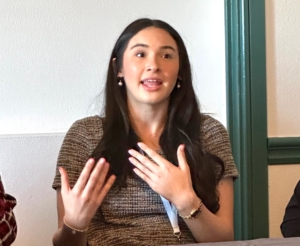 At the CCLC conference last month, the CVHEC Transfer Project once again presented an update on the historic the California Community Colleges demonstration project.
At the CCLC conference last month, the CVHEC Transfer Project once again presented an update on the historic the California Community Colleges demonstration project.
A special CVHEC guest panelist was student Araceli Tilley who testified how the project’s Program Pathway Mapper software is a major tool for self-starting students like herself even beyond first-time admission. Joining her and Carrizosa in CVHEC’s presentation at CLCC were Tom Burke, interim chancellor of the Kern Community College District, and Dr. James Zimmerman, special assistant to the executive vice chancellor and provost for Transfer Initiatives at UC Merced.
CVHEC DIRECTOR’S MESSAGE (November 2023)
Chancellor Christian reflects her
commitment to California students
Greetings Colleagues and Friends of CVHEC,
Greetings and welcome to this beautiful fall weather as we prepare for the upcoming holiday season and the end of the fall semester.
We are delighted to report that we are coming off a very successful Central Valley Higher Education Consortium Summit 2023 held at the Fresno convention Center Oct. 20 when we were joined by over 150 of our friends and colleagues to showcase the work of consortium member colleges and universities over the last year.
The highlight of the summit was welcoming our new California Community Colleges Chancellor, Dr. Sonya Christian, home to the Central Valley to serve as our keynote speaker.
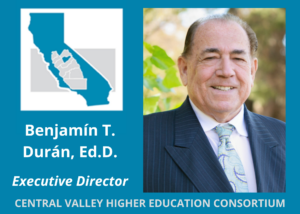 As expected, her presentation was inspiring and reflected her commitment to students in the state. Dr. Christian took this opportunity at the summit to announce and launch the CCCCO Central Valley Transfer Pathways Demonstration Project that will build upon the progress of our own Transfer Project partnership between the community colleges, the CSUs and UC Merced here in the valley. The CCCCO project is unique in California in that it includes the three segments of public colleges and universities and will eventually include the independent universities as well.
As expected, her presentation was inspiring and reflected her commitment to students in the state. Dr. Christian took this opportunity at the summit to announce and launch the CCCCO Central Valley Transfer Pathways Demonstration Project that will build upon the progress of our own Transfer Project partnership between the community colleges, the CSUs and UC Merced here in the valley. The CCCCO project is unique in California in that it includes the three segments of public colleges and universities and will eventually include the independent universities as well.
In this issue’s “What the CV-HEC is happening” blog, you will read an update about CVHEC’s innovative approach to delivering college dual enrollment math courses for high school students throughout the region via our Math Bridge project in partnership with CVHEC partner, College Bridge. The project, designed to get high school students through their first gateway college math course, will serve as a springboard for completing their degrees.
Also please plan on attending the virtual zoom San Joaquin Valley Affordable Internet Adoption Summit on Thursday, Nov. 9, from 8:30 a.m. to 12:30 p.m. The deadline to register is Nov. 7 at: https://bit.ly/SJVSummitRSVP. Bringing affordable broadband internet services to the most vulnerable populations in the Central Valley is an important part of the work CVHEC does in the valley.
Finally, enjoy our summit photo galleries where we share images and comments about the recent CVHEC summit as well as the board meeting and reception they day before. I am sure you will see many familiar faces.
Have a great November and a wonderful and restful Thanksgiving Holiday with family and friends!
CVHEC Summit 2023 wrap: a myriad of takeaways for participants
Porterville College President Claudia Habib (third from left) introduced CVHEC Summit student panelists Hailee Guerra, Araceli Tilley, Jesús López Nuñez, Alondra Veloz and moderator Dr. Carole Goldsmith, chancellor of the State Center Community College District.
Student panelist ‘earns’ a trip to CCLC to share
her transfer experiences statewide
BY TOM URIBES
CVHEC Communications/Media Coordinator
See CVHEC Summit Media Coverage: KVPR Radio and GV Wire. (MORE)
For Araceli Tilley, an alumna of Merced College, the Program Pathway Mapper used by the CVHEC Transfer Project proved to be not only useful for her transfer to UC Merced in fall 2022, it provided her an easy way to map her college courses for her final two years of college at UC Merced that is leading up to graduation in May 2024 with a degree in psychology.
Araceli shared her experiences on the student panel at the Central Valley Higher Education Consortium Summit 2023 held in Fresno Oct. 20 where the breadth and depth of CVHEC activities such as the Transfer Project were showcased. The summit is sponsored by College Futures Foundation.
She was joined by four other students who shared their experiences in activities CVHEC has sponsored and how much their success could be attributed to those initiatives: Hailee Guerra, Araceli Tilley, Jesús López Nuñez and Alondra Veloz.
“The mapper provided a straight path that really helped me out, especially because counseling and advising is super impacted at many colleges and you don’t always get to meet in-person with advisors so it was nice that I was able to self-direct using it,” Araceli said.
“And since I worked at Merced College as an outreach ambassador, I was able to help other students showing them how it works. It’s a very useful tool, especially for students who are self-directed.”
From a major announcement to kick off the day to the student testimonials, the CVHEC Summit Oct. 20 at the Fresno Convention Center accomplished its goal of convening educators and community leaders to continue developing a unified voice for higher ed issues.
“The student panel was a glimpse into the reason why educators dedicate themselves to this profession,” said Dr. Benjamín Durán, CVHEC executive director.
Araceli’s assessment of Program Mapper and how it helped her plan courses throughout college earned her an invitation by Stan Carrizosa, CVHEC regional coordinator who is the lead for the consortium’s Transfer Project, to participate in the presentation his team will make to the Community College League of California Annual Convention Nov. 16 in Indian Wells.
“I’m very excited about going to the Indian Wells conference,” Araceli said. “I didn’t expect to get asked to go to another conference but it’s a great opportunity to voice my experiences as a transfer student and how the Mapper tool helped me.”
But a key highlight of the summit came early in the day as Dr. Sonya Christian, chancellor of the California Community Colleges, returned “home” to deliver the summit keynote.
In presenting on the CCC Vision 2023 strategy plan, she announced the new Central Valley Transfer Pathways Demonstration Project, evolving from CVHEC’s own Transfer Project, to help community college students streamline the transfer process to four-year. (See story).
“As expected, Chancellor Christian’s presentation was inspiring and reflected her commitment to students in the state,” Duran said.
PHOTO GALLERIES for the CVHEC Board of Trustees and Summit Reception (Oct. 19) and
the Central Valley Higher Education Summit (Oct.20)
at the Fresno Convention Center:
Historic Transfer Project spurs statewide movement to increase transfer rates
CVHEC Summit Oct. 20 features Central Valley Transfer Project/Mapper update
BY STAN CARRISOZA, CVHEC Regional Coordinator
President-emeritus – College of the Sequoias
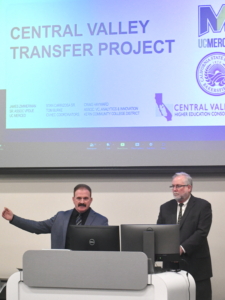
At left, CVHEC Regional Coordinators Stan Carrisoza and Tom Burke present the Transfer Project (Burke is now serving as interim chancellor of the Kern Community College District).
As we enter the third phase of the Central Valley Transfer Project, we are pleased to report great progress has been made ranging from its infancy two years ago to nationwide interest — including possible expansion into another region of California in the near future — as our team is invited regularly to present at state and national conferences.
A presentation and update will be given at the upcoming Central Valley Higher Education Consortium’s 2023 Summit Oct. 20 in Fresno, as well as at conferences in November and December.
Originally born out of dissatisfaction with Central Valley community college transfer rates to University of California, Merced, this effort has spurred a statewide movement at multiple levels to increase the number of successful community college transfers to four-year institutions.
The state budget allowed CVHEC to help the community colleges secure state funding to purchase ongoing access to the software element of the project known as Program Pathways Mapper (PPM).
Recent reporting regarding the California State University and the UC Board of Regents has energized efforts to increase community college transfers and mobilize around successful transfer strategies.
Successful strategies are the foundation of the CVHEC Transfer Project. We have codified simple, straightforward activities for CC and CSU/UC faculty to convene and collaborate to map accessible transfer pathways in numerous discipline majors. In a breakthrough effort by UC Merced, its faculty agreed to review and build on the already successful CSU transfer patterns approved in the Associate Degree for Transfer (ADTs).
Following the pilot project in 2021 with UC Merced, Bakersfield College and Merced College, the CVHEC/UC Merced Transfer project has grown to include several more CVHEC colleges including Porterville, Reedley, Madera, West Hills Coalinga, West Hills Lemoore, Modesto, San Joaquin Delta, Yosemite and Columbia. The project has also included Central Valley four-year institutions CSU Bakersfield and CSU Stanislaus.
Over the past year the project has piqued the interest of the Aspen Institute, the Public Policy Institute of California, the Chief Student Services Officers Association, College Futures Foundation and Complete College America.
Interviews and conferences with these organizations have brought broad exposure to the project and this fall CVHEC will initiate the SoCal Transfer Project being planned to emanate from the North Orange County Community College District. These plans include NOCCCD colleges Fullerton and Cypress to engage with UC Merced, UC Irvine and CSU Fullerton.
As previously reported, early results from the first 5,000 incoming freshmen at Bakersfield College in 2022 shows a strong positive impact from the Transfer Project.
At the core of the project is the Program Pathways Mapper software platform. The ease of access for students, counselors, advisors, HS counselors and parents has proven to be the key factor in success versus other degree auditing software systems.
Among those first 5,000 freshmen tracked, students using the PPM vs. their counterparts not using PPM eliminated the achievement gap among underrepresented students in their On-Path Percentage of courses successfully completed. This significantly reduced their number of units to degree.
We invite interested colleagues and partners to join us in this movement to increase successful transfers by attending our scheduled presentations this fall and winter. In addition to our summit in Fresno later this month, you will find CVHEC’s Transfer team sharing the project at the annual Community College League of California Conference in November and at the Complete College America Conference in December.
For more information: contact Stan Carrizosa at scarrizosa44@gmail.com or visit the Central Valley Transfer Project page on the CVHEC website.
See our full list of Transfer Project stories: Central Valley Transfer Project Archives
See the Central Valley Transfer Project page.
CVHEC DIRECTOR’S MESSAGE (October 2023)
CVHEC Summit panelists bring dynamic convos to the table
Greetings Colleagues and Friends of CVHEC,
We are delighted to welcome you to the October edition of our CVHEC e-newsletter as we enjoy fall in the valley, which is always a special time of the year.
With our 2023 CVHEC Annual Summit, “Student Success through Equity and Inclusion — Thriving in the Central Valley” just around the corner (Friday, October 20), we present our lineup of distinguished panelists and the official agenda. We are especially excited to welcome back to the Central Valley our own Dr. Sonya Christian, newly appointed Chancellor of the California Community Colleges as well as the many CVHEC board members who will introduce and serve on the four dynamic panels we are presenting this year. Dr. Christian, the former chancellor of the Kern Community College District and former CVHEC board member, will serve as our special guest and deliver the keynote address.
 If you have not registered for our no-cost summit yet, please take the time to do so. Join us as we showcase the great work being done by our colleges and universities in our nine-county region that continues to capture state and national attention.
If you have not registered for our no-cost summit yet, please take the time to do so. Join us as we showcase the great work being done by our colleges and universities in our nine-county region that continues to capture state and national attention.
You will hear about and discuss our innovative Math Bridge Project intervention for targeted high school students and our Central Valley Transfer Project, which is providing pathways to our partner universities from our local community colleges (for a preview, see colleague Stan Carrisoza’s Transfer Project update in this issue). The summit also will feature a panel of Central Valley students who have benefited directly from these initiatives.
As always, we also direct you to our “What in the CV HEC is Happening?” Blog that features guest contributors each month. This month we are pleased to share the contribution from Sanger West High School (SWHS) English teacher Jade Martínez.
Mrs. Martinez is amongst the first of our Fresno/Madera K-16 Collaborative Master’s Upskilling grads from National University. This fall, she has taken her new degree into the classroom at SWHS and is delivering her first college English dual enrollment class to her students. This, folks, is what it is all about. Great job Jade!!
We hope to see you on Oct. 20, at the Fresno Convention Center for our CVHEC Summit. Feel free to bring your colleagues and partners (registration).

